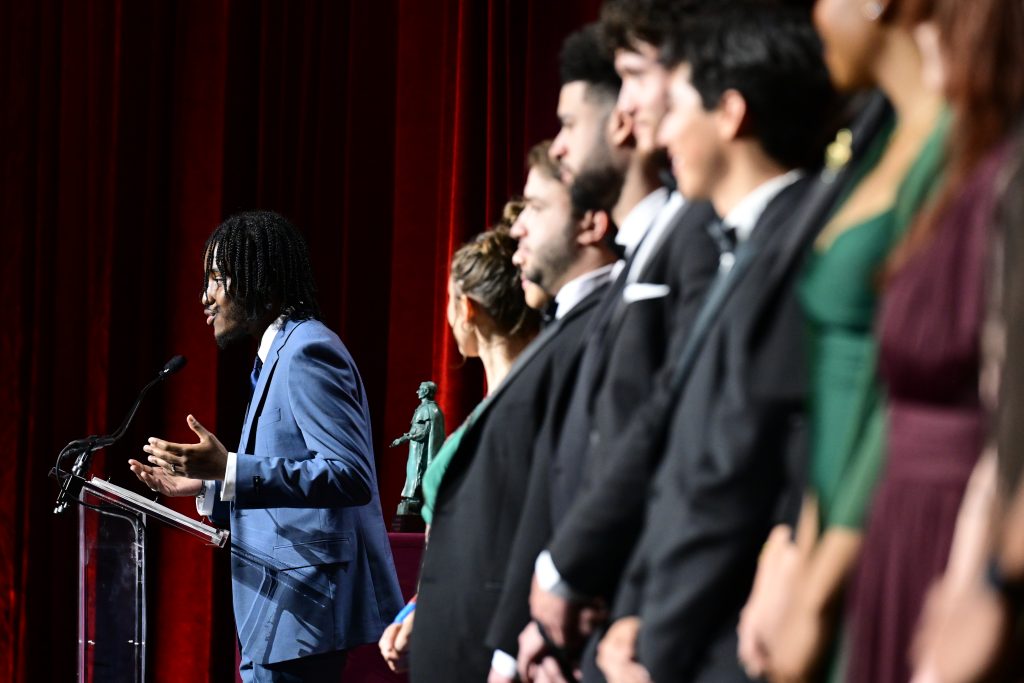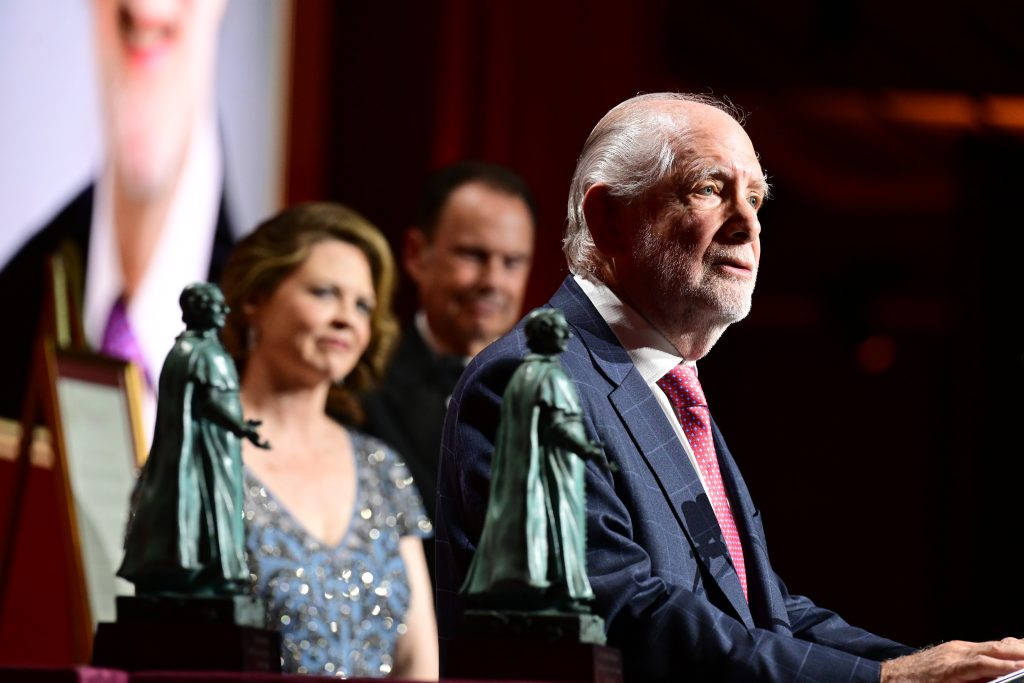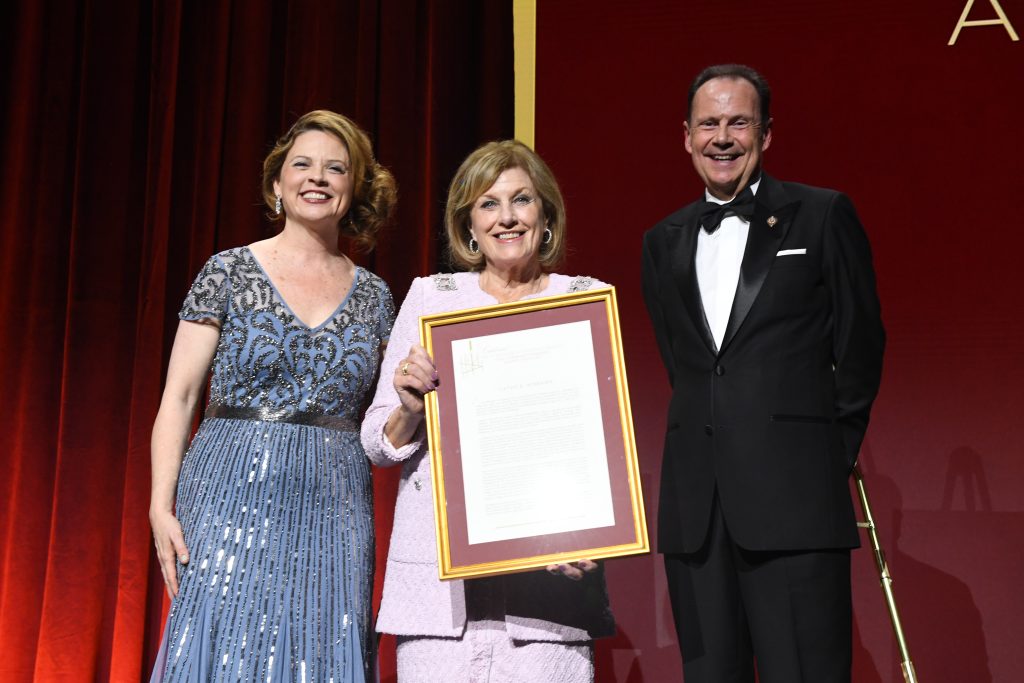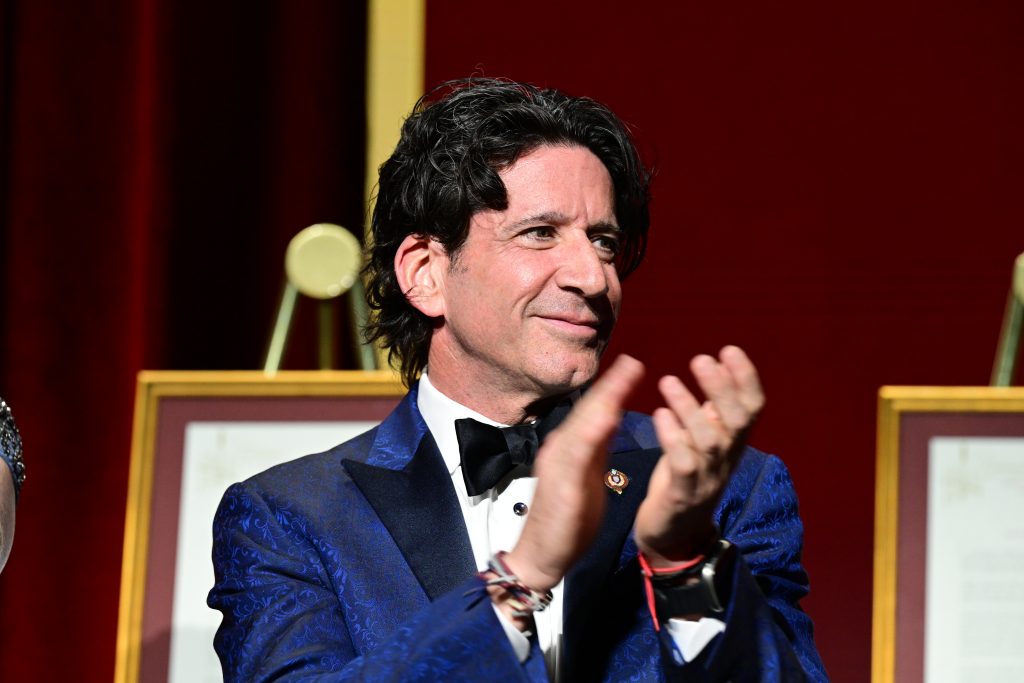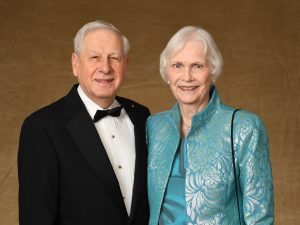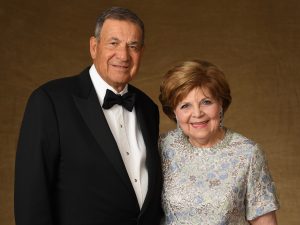
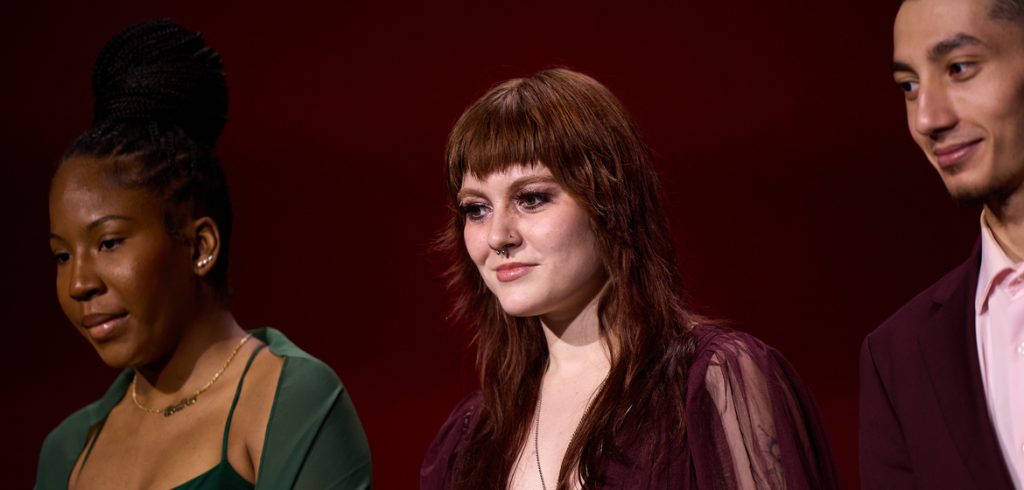
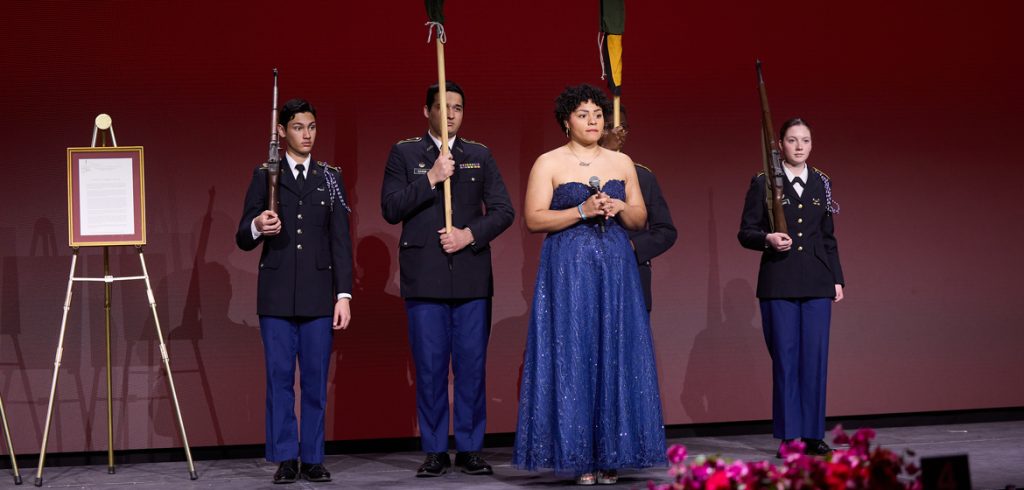

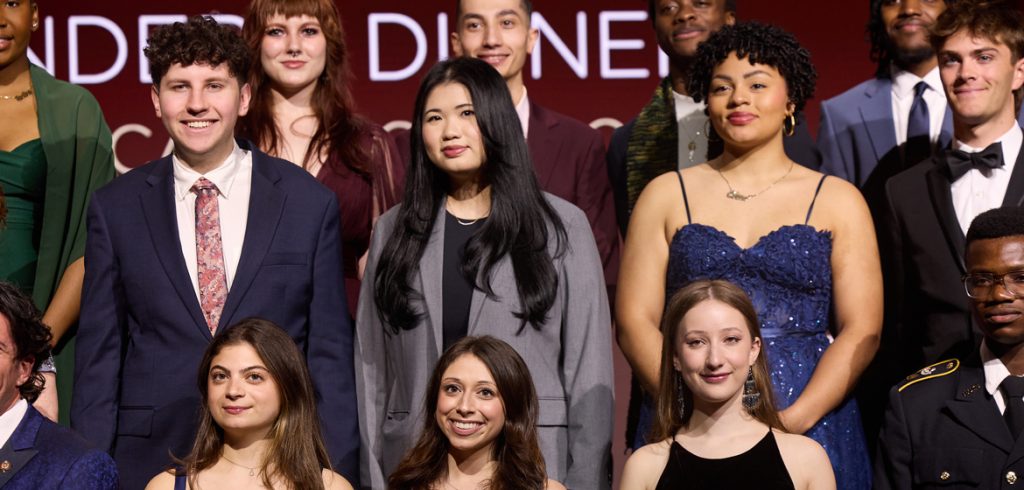
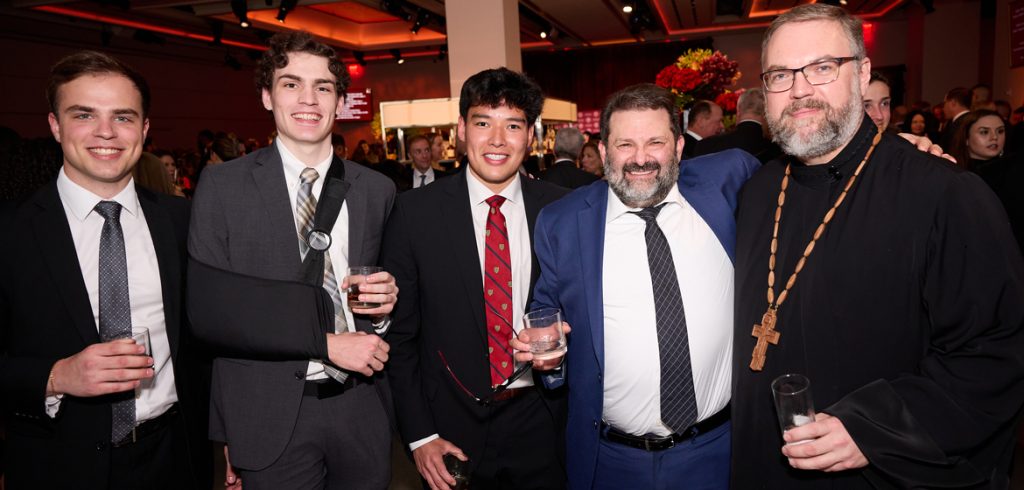
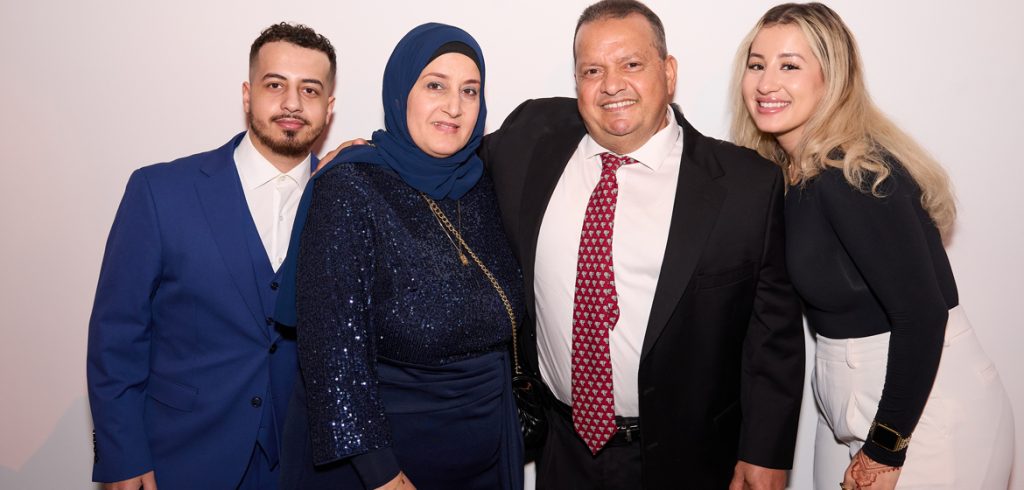
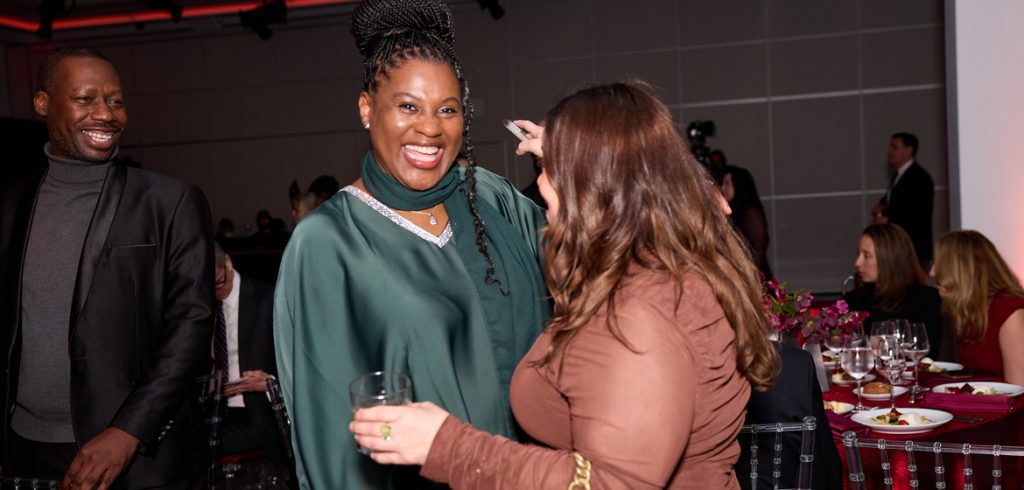


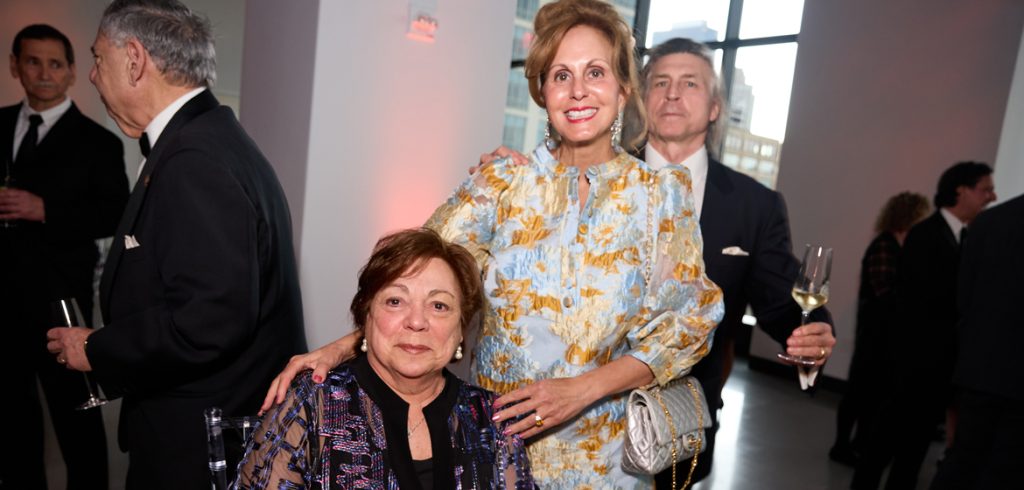
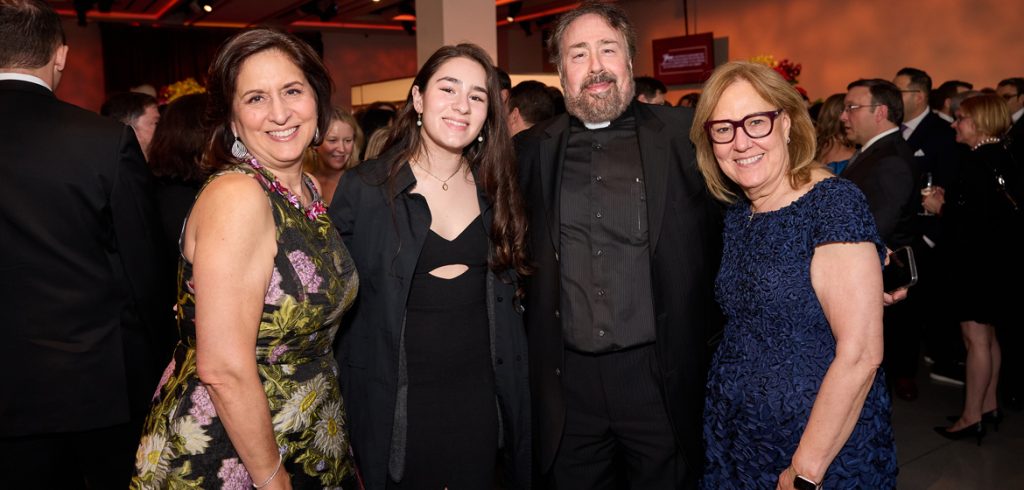
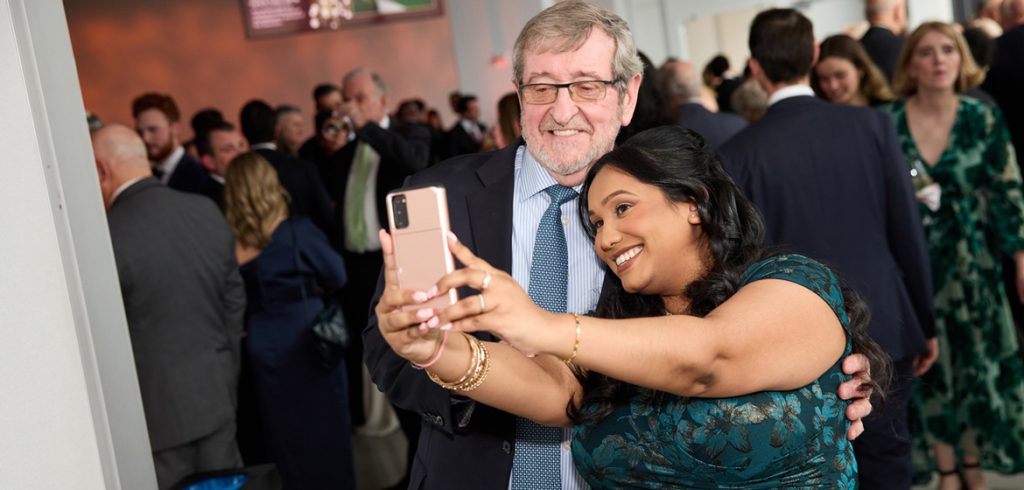
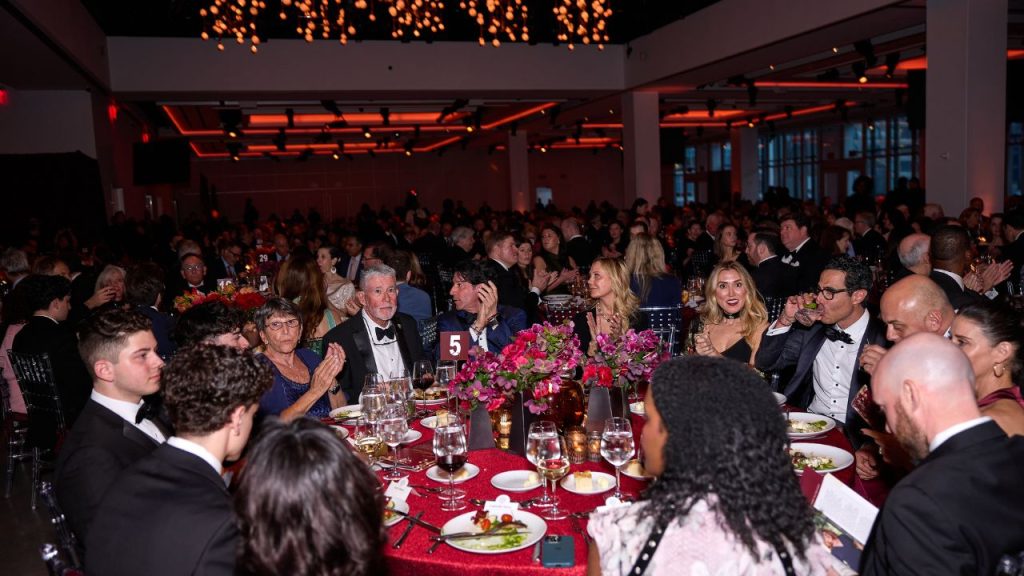



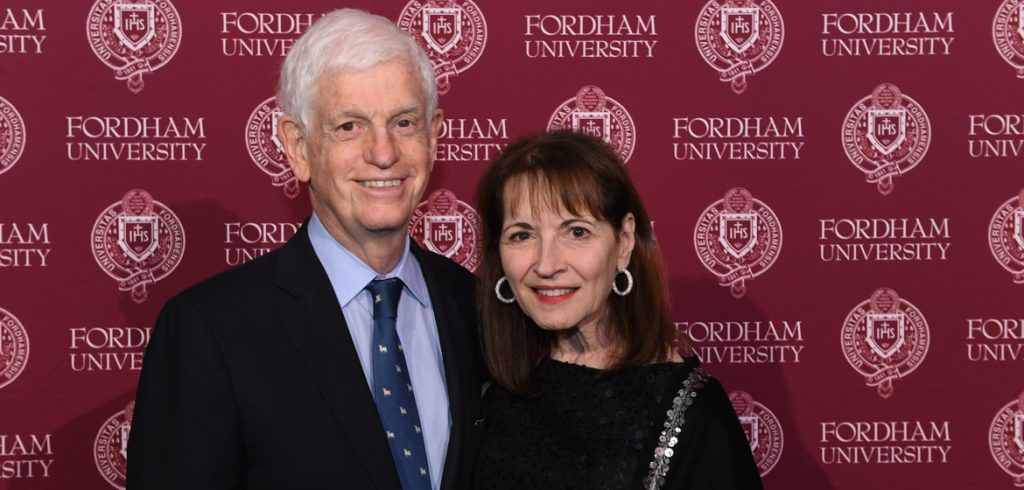

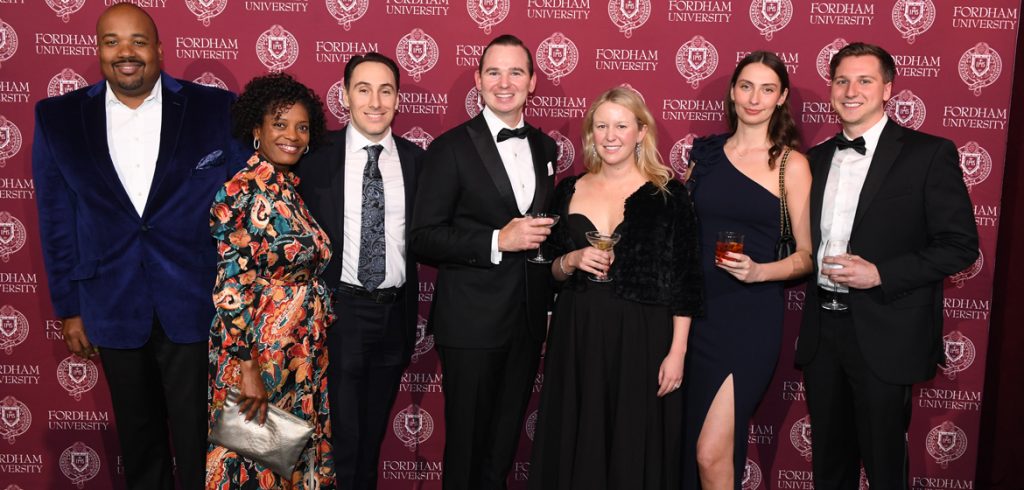
Manhattan’s Glasshouse venue was buzzing with pride on Monday evening as 800 Fordham donors, alumni, and scholars gathered for the Fordham Founder’s Dinner. They had much to celebrate: The dinner raised more than $2.5 million for the Fordham Founder’s Undergraduate Scholarship Fund and commemorated the successful conclusion of the University’s fundraising campaign, Cura Personalis | For Every Fordham Student.
“This night is so much fun. We toast each other, we celebrate Fordham, we pray together and we laugh,” said University President Tania Tetlow. Fordham gives students the skills they need to matter to the world, she said, shouting out the alumni in the room as “proof” that it works. “So for all of you who came tonight, thank you.”
The annual Founder’s Dinner recognizes an exceptional group of students, the Fordham Founder’s Scholars, as well as the generous donors who make their studies possible. Three benefactors—Henry S. Miller, FCRH ’68, PAR; Cathy E. Minehan; and David M. Tanen, LAW ’96—were presented with the Fordham Founder’s Award in honor of their personal accomplishments and unwavering support of the University.
A Night of Celebration and Gratitude
His Eminence Cardinal Timothy Dolan, archbishop of New York, who received an honorary doctorate from the University in 2012 and a Founder’s Award in 2016, delivered the evening’s invocation. Next, Alexa Carmona, FCRH ’26, sang the national anthem, while members of the joint service Color Guard of Fordham’s Army, Navy, and Air Force ROTC posted the colors.
“Fordham is proud of its 177-year military legacy,” the announcer said, noting that the University “is home to more than 500 military-connected students, including veterans, veteran dependents, and future leaders in our ROTC programs.”
Armando Nuñez, GABELLI ’82, chair of Fordham’s Board of Trustees, then gave a brief introduction.
“We have so much to celebrate tonight,” said Nuñez. He noted that Fordham had surpassed its fundraising goals for the Cura Personalis campaign, which concluded in the fall, raising over $370 million to enhance the student experience, increase financial aid, and more. “We are so incredibly proud of our talented students and so appreciative of our generous donors,” Nuñez said.
Watch Nuñez’s full speech.

Speaking on behalf of the 48 Founder’s Scholars, Yves Andradas, FCLC ’25, expressed gratitude for the donors to the scholarship fund for opening the doors to a Fordham education for students like him.
“Every donor in this room plays a significant role in making my dream … a reality. So on behalf of all the students who were graced enough to be named Founder’s Scholars, our gratitude stretches far and wide,” said Andradas, who is studying philosophy and theology. “If hearing it from me isn’t enough, let my immigrant Haitian parents tell you they are so grateful not to have a college tuition bill at their doorstep every semester.”
Watch Andradas’ full speech.
Helping the Next One in Line
While accepting his award, Henry Miller shared words of wisdom from country music star Tim McGraw.
“When you get where you’re going, don’t forget to turn back around and help the next one in line,” said Miller, quoting from McGraw’s song “Humble and Kind.”
It was an appropriate sentiment from Miller, who attended Fordham on scholarships and then went on to build an extraordinarily successful career in business. He has since served on Fordham’s Board of Trustees and given generously to the University to support the Jewish studies program, athletics, scholarships, and more.
Miller went on to share heartfelt advice with the scholars and attendees that touched on six key principles: philanthropy, integrity, respect, hard work, talent, and sense of humor.
Watch Miller’s full speech.
Cathy Minehan, who made history as the first female president of the Federal Reserve Bank of Boston, discussed her late husband, E. Gerald Corrigan, former president of the Federal Reserve Bank of New York and proud Fordham alumnus, benefactor, and trustee.
“Jerry credited Fordham with preparing him for the economic and theoretical challenges he faced in his career, but way more importantly, for the strong public service thread of Fordham’s Jesuit education,” said Minehan. “I have been honored to continue Jerry’s legacy of generosity in supporting Fordham students.”
Watch Minehan’s full speech.
David Tanen, a biotech entrepreneur whose generosity has greatly impacted the Fordham School of Law, expressed his appreciation for the opportunity to contribute and urged others to follow suit. “I encourage everyone to uphold the values Fordham represents and support the community that has given us so much,” said Tanen, who has supported scholarships, professional programs, and more at the Law School.
Watch Tanen’s full speech.
Tetlow, addressing the Founder’s Scholars, echoed donors’ remarks and encouraged students to pay it forward when they can.
“You have no idea how happy it makes us to do for you what others did for us. We hope that one day, years from now, you get a chance to invest in other young people and that, at that moment, you’ll remember this magical night,” said Tetlow.
Watch Tetlow’s full speech.
Looking Toward the Future
Founder’s Scholar Hiba Haloui, GABELLI ’25, one of the student emcees during the second half of the evening, offered a brief reflection on the close of the Cura Personalis campaign.
“The impact of this campaign and every Fordham donor was felt by every Fordham student,” Haloui said, before sharing that the Founder’s scholarship was the “cornerstone” of her journey from Morocco to New York.
Founder’s Scholar Noah Khalil, GABELLI ’25, introduced a video featuring student reflections in celebration of the close of the Cura Personalis campaign. He expressed gratitude to the evening’s donors.
“The Fordham Founder’s Scholarship is an immense blessing, not only for its financial support, but mainly for what it symbolizes,” said Khalil. “It’s a representation of your belief in our ability and potential to achieve more than we ever thought possible.”
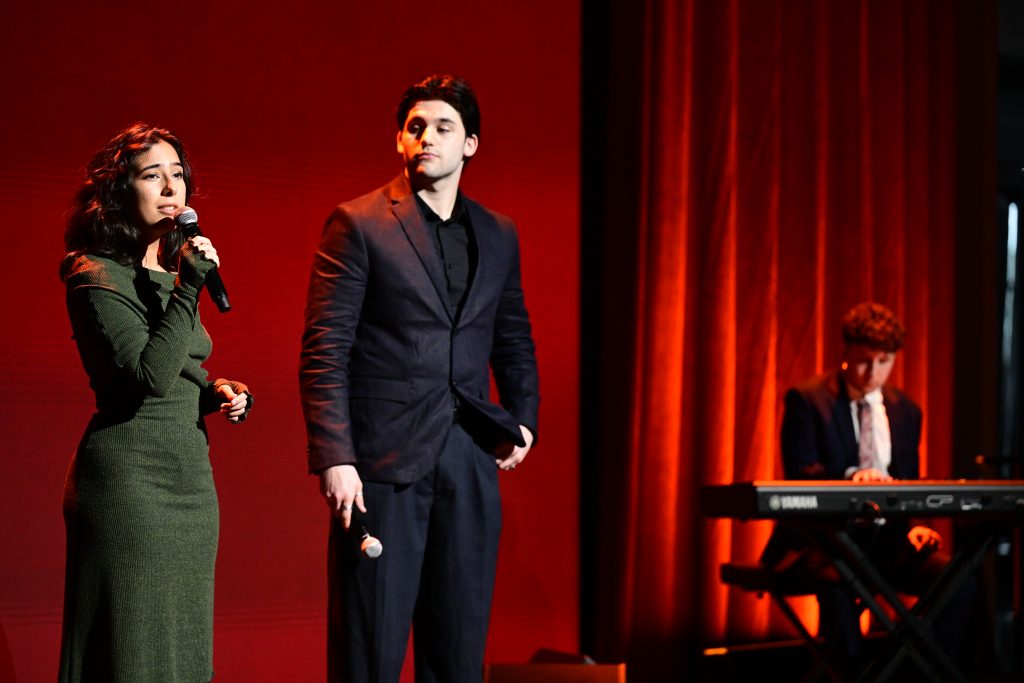
In her closing remarks, President Tetlow sketched out a bright future for the University, made possible by the ongoing support of Fordham’s community.
She highlighted the recent announcement of a $100 million donation from trustees emeriti and former Founder’s honorees Maurice and Carolyn Cunniffe—the largest gift in the University’s history—which will pave the way for a cutting-edge science facility and the expansion of STEM degree programs.
Tetlow said Fordham will set itself apart by not only teaching technical skills, but by giving students the ethical foundation to wield emerging technologies like AI for the greater good.
“For almost two centuries we’ve transformed lives as Ignatius taught us. And thanks to all of you, we will keep doing that for centuries to come,” said Tetlow. “The great philosopher Archimedes said, ‘Give me a fulcrum and I shall move the world.’ Fordham is that fulcrum and all of you have used it to move the world tonight.”
The video below, shown at the dinner, was created to celebrate the close of the Cura Personalis campaign. It is a gift of thanks from our students to our donors:
]]>His acceptance was especially joyous for his parents, neither of whom had been able to go to college. Later, when he brought them to the Rose Hill campus, “you could see how proud they were that I was going there. And I felt exactly the same way,” he said. “So I developed a love for Fordham that never left me.”
That love stayed in the background during the busy decades following his 1969 graduation from Fordham College at Rose Hill as an English major. Within two years he was a newly married father of twins. He went into banking, earning an MBA from Pace University at night, and built a successful executive career at firms including American Express; Black Rock Capital, which he co-founded; and Cannon Capital Ltd.
Over the past few decades, he has come back to Fordham in a number of roles: He is a longtime trustee and former member of the President’s Council who has often visited Fordham classrooms and spoken at student-focused University events. He was an advisory board member for Fordham’s programs in London, where he and his family lived for 20 years. He is a 2011 recipient of the Fordham Founder’s Award, and he is also a Fordham parent—of the four children born to him and his late wife, Jane M. Flaherty, two are Fordham graduates.
He is also a generous donor to the University. Among their other gifts to Fordham, he and Jane established two scholarship funds: one named for Roy E. Haviland, GABELLI ’69, a Navy pilot and classmate of Jim’s who was killed in a midair collision off the coast of North Vietnam in 1973, and one named for Jane Flaherty, to which he is making a new contribution. Jim serves on the committee for Fordham’s current campaign, Cura Personalis | For Every Fordham Student, which seeks to raise $350 million for priorities including access and affordability.
Those were always key priorities for the Flahertys—as an undergraduate, Jim faced financial challenges that nearly derailed his Fordham education. His own struggles informed the Flahertys’ commitment to giving scholarship support to students who, by now, number in the dozens.
Who is someone at Fordham who made a difference for you?
Father George McMahon [former dean of Fordham College at Rose Hill and namesake of McMahon Hall on the Lincoln Center campus]probably had the biggest impact on me when I met with him in junior year. I had ripped my knee up playing baseball at Fordham and had withdrawn from school for a semester, which was exciting because it meant I lost all my scholarships. Then my father had a stroke when I was beginning my junior year. I had to really juggle things around—because I didn’t have much money and because one parent was no longer able to work, I went to work on Wall Street, at the Bank of New York, running a collating machine that processed mutual fund statements.
And so I had to go see Father McMahon to talk about things, and he did me a world of good. I didn’t think I was going to be able to stay at the University, but he did all sorts of things for me that let me hold on to my scholarships, and he also let me fit classes into my work schedule. He went out of his way to make sure that I stayed in school, and I wound up, fortunately, graduating on time.
How did your undergraduate experience impact your giving?
My last two years at Fordham were a bit of a blur—I worked from midnight to eight o’clock in the morning, came up to Rose Hill, did my classes, went home to Brooklyn, slept for four hours, and then went back to Wall Street and worked from midnight until eight o’clock again. So it wasn’t exactly the kind of educational experience I think you’d want anybody to have. I don’t want anybody to ever have to go to Fordham the way I did.
My wife, Jane, also wanted us to support Fordham, for two reasons: Neither she nor any of her four brothers got to go to college, because their parents couldn’t afford for any of them to go. Also, she watched how hard it was for me, although she was extraordinarily supportive of what I was trying to do.
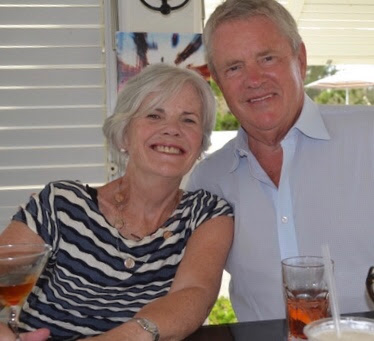
You once said she loved Fordham even more than you did. Can you elaborate?
When I was at Fordham, she was with me up on the campus every weekend, going to basketball games, all sorts of things. She had a college experience in a vicarious way, and she just loved every minute of it. In the years after I graduated, she was at Fordham fairly often with me, and then when we moved back from England, we were busy with Fordham things quite a bit.
By the way, when I was asked to go on the Board of Trustees by [Joseph M. McShane, S.J., president of Fordham], I said no, for a variety of reasons. Well, if you know Father McShane, you know he doesn’t give up. So he kept asking—I’m on the phone with him, in a car with Jane, having just landed in London, and I’m saying no, and there are pauses, and Jane finally said, “What’s this all about? Give me the phone.” So I handed her the phone and Father said he wanted me to go on the board. “Oh, OK,” she said. “He’ll do that.” End of story!
What was it like meeting your scholarship recipients at Fordham’s annual Scholarship Donors and Recipients Reception?
Our scholarship recipients would show up, and my wife would sit down with them all around a table. She treated them like their mother—urging them to eat something, asking how things were going for them. Like me, they were enthralled by her. Some of them would tell her they would never have been able to come to Fordham if they didn’t have the scholarship that she gave them. In some respects, it was a little bit like repeating my history. There was one young man whose father had died two months after his acceptance to Fordham. He was a policeman who had been killed. And it was a real question, whether this young man was going to be able to attend. And so every year for four years, he’d be the first one of the scholarship recipients in the room so he could have a private conversation with Jane. When he was a senior, his mother came, and that was a pretty tearful meeting. But yes, we had several students thank us.
Roy Haviland’s sister, Dorene Prinzo, still comes to the scholarship reception every year. He was my best friend at Fordham. Who, by the way, just to make it clear, my wife had a terrible crush on before she even agreed to talk to me.
Do you have advice for today’s graduates?
I’ve told students that they had better like what they do for a living and like the people they do it with. It would be better to quit their job than to do a job they hated, because it would become obvious that they hated what they were doing, and that kind of spills over as you go look for different jobs. If you’re doing something you don’t like to do, sooner or later, you’re going to do a bad job at it.
Is there a book that had a lasting influence on you?
There are two books, and the first is The Power and the Glory. It’s a novel by Graham Greene about a Catholic priest during the repression of the church in Mexico in the 1930s, and it shows what happens if you have the intestinal fortitude to do the right things. The other book is The Wall, by John Hersey, and it’s about the ghetto in Warsaw, Poland, in World War II, and how the Poles had to outwit the Nazis simply to survive. I went to Warsaw with my oldest son, and we saw the train station where they made the Jews get on the train to the concentration camps. He still talks about that. The Wall has stuck with me forever. I have a copy of it on my nightstand.
What are you optimistic about?
I am an optimist because America’s still far and away the greatest nation in the world. I think Americans will survive and thrive on the opportunities that America creates time and time again for its citizens. I am a believer in the movement toward diversity that’s underway, and Fordham’s history is all about diversity and opportunity—we were created in 1841 because Catholics couldn’t go to university.
What’s the best piece of advice you ever received?
My Irish Catholic mother, who doted on her only child, said, “You should marry that girl as soon as she’ll have you,” referring to Jane. Fundamentally, the most important decision I ever made was to marry my wife, and I did that in part because my mother told me to.
Jane M. Flaherty died peacefully on February 4, 2019, after an illness. On December 16, 2019, the University posthumously awarded her the Fordham Founder’s Award, noting, among other things, her dedication to the cause of Catholic education, her generosity of spirit, and the opportunities she created for the students of Fordham.
Learn more about the story behind the Roy E. Haviland Endowed Dean’s Scholarship Fund.
To inquire about supporting scholarships and financial aid or another area of the University, please contact Michael Boyd, senior associate vice president for development and university relations, at 212-636-6525 or [email protected]. Learn more about Cura Personalis | For Every Fordham Student, a campaign to reinvest in every aspect of the Fordham student experience.
]]>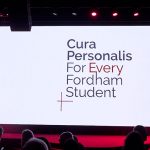
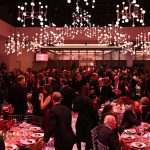
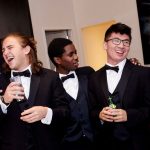
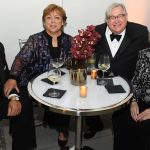
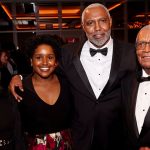
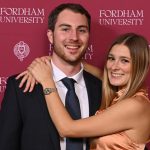
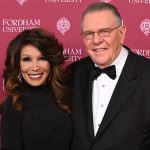
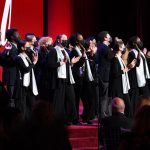

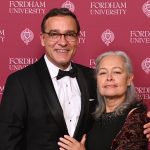
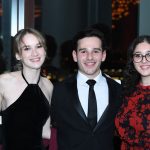
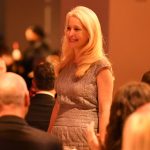
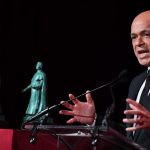
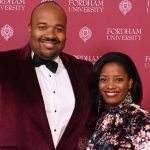
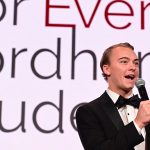

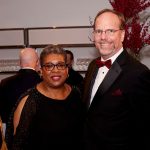
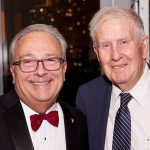
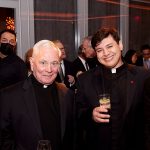
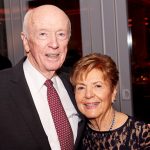
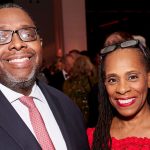 The 2021 Fordham Founder’s dinner was marked by firsts: the first time the dinner raised more than $3 million; the first time in more than two years that the event has been held in person; Fordham’s first time at The Glasshouse, a sparkling new venue on the West Side of Manhattan; and the official launch of the University’s new fundraising campaign, Cura Personalis | For Every Fordham Student.
The 2021 Fordham Founder’s dinner was marked by firsts: the first time the dinner raised more than $3 million; the first time in more than two years that the event has been held in person; Fordham’s first time at The Glasshouse, a sparkling new venue on the West Side of Manhattan; and the official launch of the University’s new fundraising campaign, Cura Personalis | For Every Fordham Student.
Fordham’s donors, alumni, and friends gathered on Nov. 8 not only to honor the Founder’s Scholars—Fordham students whose scholarships are supported by the event—but also to pay tribute to the evening’s honorees: Emanuel “Manny” Chirico, GABELLI ’79, PAR; his wife Joanne M. Chirico, PAR; and Joseph H. Moglia, FCRH ’71.
“I would like to thank all of you for supporting this long-overdue annual celebration of our beloved University,” said Joseph M. McShane, S.J., president of Fordham.
Father McShane noted that there was “eager longing” for this Founder’s Dinner, in part because of the last 18 months but also because it kicked off the new campaign for the student experience.
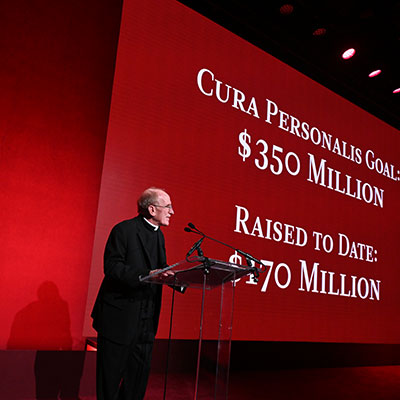
“We also celebrate the public launch of the Cura Personalis campaign, a campaign that will make it possible for the University to continue to redeem the promise that it has made to its students for 180 years: the promise to provide them with the kind of personal, empowering, and transformative care that has always been the hallmark of a Fordham education,” he said. “I am happy to tell you that, thanks to the generosity that you have already shown, we have already raised $170 million toward the $350 million goal. And for that, I thank you from the bottom of my heart.”
All attendees were required to be fully vaccinated and wear a mask when entering The Glasshouse, which featured sweeping views overlooking the Hudson, outdoor terraces, and an airy ballroom lit by modern chandeliers.
Supporting the Students
David Ushery, the anchor for NBC 4 New York’s 4 p.m. and 11 p.m. weekday newscasts, emceed the Founder’s Dinner, which began in 2002 and has raised more than $42 million to support the Fordham Founder’s Scholarship Fund. Ushery received an honorary doctorate from Fordham in 2019, and his wife, Isabel Rivera-Ushery, is a 1990 graduate of Fordham College at Rose Hill.
“You have supported 130 Fordham students through this program—students who would not have benefited from our fine Jesuit education without your support and generosity,” Ushery told the more than 1,000 attendees. “You have impacted the scholars’ career paths as they are ‘setting the world on fire.’ Your impact on them guides their impact on others.”
The New Campaign
That impact will be taken to new levels through the University’s new fundraising campaign. Cura Personalis | For Every Fordham Student, which aims to enhance the student experience as well as prepare students to work for social justice and be leaders in today’s world. The campaign pledges to renew Fordham’s commitment to care for the whole student as a unique, complex person and to nurture their gifts accordingly.
The campaign features four main pillars: access and affordability, academic excellence, student wellness and success, and athletics—with diversity, equity, and inclusion goals embedded in each of them. The night also featured the debut of a new campaign video that highlights the student experience at Fordham.
Founder’s Scholar Sydney Veazie, a senior at Fordham College at Rose Hill, said that the Jesuit value of cura personalis, or care of the whole person, has been an essential part of her experience at Fordham. At Fordham, Veazie said, the Latin noun cura is transformed into a verb—something that students, faculty, and staff put into action.
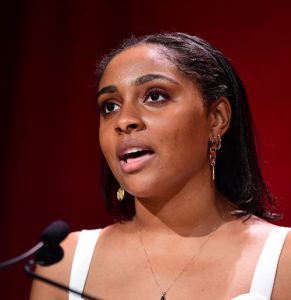
“[Cura Personalis] becomes an active call, a mission statement, and a defining feature of this University to care for the students who call it home—to attend to us and to our needs,” said Veazie, a double major in international political economy and classical civilization. “Each student can expect personalized care, personalized attention during our time here.”
Veazie, a Fordham tour guide who currently volunteers as a team lead for the Fordham chapter of Consult Your Community and at Belmont High School, said she plans to take the lessons of cura personalis that she learned at Fordham and carry them forward.
“I’ll be going to law school in the fall of 2022, and I eventually hope to work in government and politics and infuse cura into everything I do,” she said.
Veazie said that none of this would have been possible for her or her fellow Founder’s Scholars without the support of those in attendance.
“I cannot stress enough how important this kind of investment is,” she said. “Fordham’s emphasis on cura personalis yields a student body, a community, that itches to pay forward the lessons, the care, and the holistic development we’ve received during our time here.”
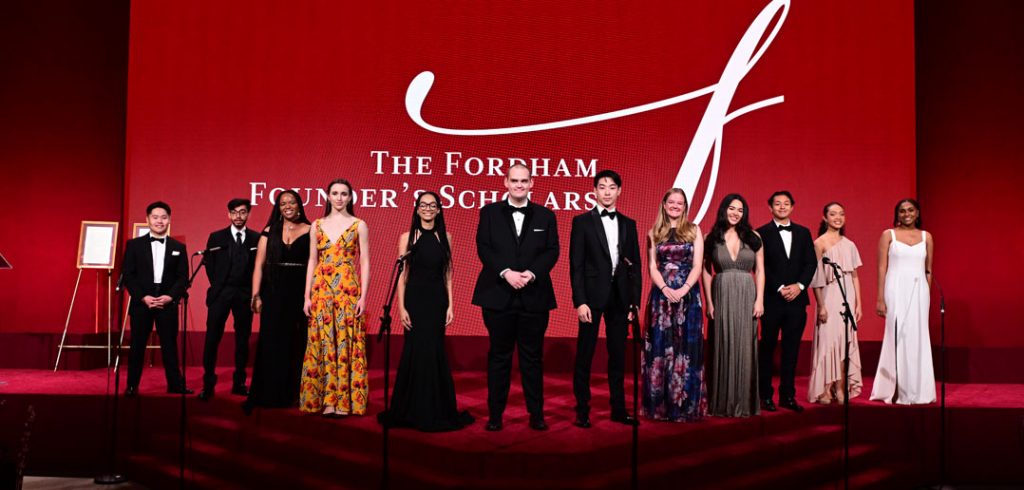
Thomas Reuter, a senior at Fordham College at Rose Hill and United Student Government president, served as student MC for the second half of the program. He said the campaign will help ensure that all students feel at home at Fordham and that they’re able to take advantage of the opportunities the University offers.
“This campaign will invest in what we love most about Fordham…its student-centered Jesuit, Catholic education that nurtures the whole person,” he said. “This campaign will renew and enhance our distinctive educational experience that has transformed lives since Fordham was founded in 1841.”
Honorees
Father McShane expressed gratitude to the evening’s honorees for their efforts to support Fordham’s mission and its students.
“You are extraordinary … you are generous with your time, treasure, and talent … and you stand as exemplars of the renewal of the University in its identity and mission,” he said.
Manny Chirico, a titan of the fashion industry, is the longtime chairman and CEO of PVH Corp., the world’s second-largest apparel company; he plans to retire next month. Chirico served as the company’s CEO beginning in 2006 and as its board chairman since 2007. He currently serves on the boards of Montefiore Medical Center and Save the Children, while Joanne serves as the vice president of the Parish Council at Immaculate Conception Church in Tuckahoe, New York, and is on the board of Montfort Academy.
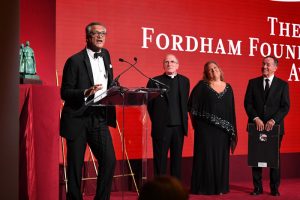
Manny, who is also a Fordham trustee, recalled that when he was a senior at Fordham, he took a philosophy class with a Jesuit professor who quoted St. Ignatius Loyola: “Go forth and set the world on fire.”
“I really like that quote, it sounded like something Vince Lombardi would say just before he sent his team out to play in the Super Bowl,” Chirico said. “I had no idea what it meant, but I wrote it down in my notebook.”
Chirico said that he asked the priest what this quote actually meant.
“In typical Jesuit fashion, he said to me, ‘Young man, that’s what you need to figure out,’” he said. “So for the last 40 years, I’ve been trying to figure out what it means to go forth and set the world on fire—I’m still working on it—but I do realize that there is no formula and no set answer. It’s a challenge to make a difference in the small things we do every day.”
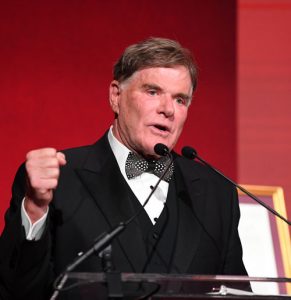
Joe Moglia has combined his love of finance and football throughout his life, working as a championship-winning defensive coordinator at Dartmouth before joining the MBA training program at Merrill Lynch and eventually becoming CEO and chairman of TD Ameritrade, a post he held for more than 24 years, before returning to football as the head coach at Coastal Carolina University. Moglia currently serves as the chair of athletics at Coastal Carolina and board chairman of Fundamental Global Investors and Capital Wealth Advisors.
When he was a senior at Fordham, Moglia took a job coaching at Archmere Academy in Claymont, Delaware, and said that he wanted to provide his players with something more than just a desire to win.
“How do you lay the foundation upon which those boys become men?” he said.
“We created a philosophy that said, ‘A real man, a real woman, a real leader, stands on their own two feet, takes responsibility for themselves, always treats others with dignity and respect, and deals with the consequences of their actions,” he said.
Moglia said that this mindset and philosophy came from Fordham.
“This is a university for others, that loves others, so for me, for whatever I may have accomplished in my life, at the end of the day I’m so incredibly proud to be part of Fordham … and hopefully as I go forward, I continue to make Fordham proud,” he said.
The Chiricos and Moglia were originally supposed to be honored in 2020, but that Founder’s Dinner was canceled due to the pandemic. They were also recognized earlier this year at a virtual toast for scholars and honorees.
The night also featured several performances: Tyler Tagliaferro, a 2017 graduate of the Fordham College at Lincoln Center, played the bagpipes as guests walked in; the Young People’s Chorus of New York City performed; Jesira Rodriguez, a Fordham College at Lincoln Center senior and a Founder’s Scholar, sang the national anthem; and the Fordham Ramblers closed the evening with an a cappella rendition of “The Ram,” Fordham’s fight song.
Father McShane called on those in attendance to honor the members of the Fordham community who preceded them by investing in and supporting current students.
“You were formed by and now possess the intangibles that make for Fordham’s greatness, and that distinguish Fordham from other universities,” he said. “You are men and women for others. You are men and women of character, grit, determination, integrity, expansiveness of heart, and restlessness of spirit. And so, I turn to you to enable Fordham to make the kind of rich transformative experience that you received here available to your younger brothers and sisters.”
“It has been, as we New Yorkers would say, ‘a hell of a year.’ And yet, we, Fordham, did not surrender,” said Joseph M. McShane, S.J., president of Fordham, raising a glass from his office at the Rose Hill campus to his computer screen during the virtual event. “Against all odds, and thanks in no small measure to your great generosity, we were once again able to lean into the moment and to move forward with a sense of purpose and with defiant hope … On behalf of everyone at Fordham, especially our students, I thank you for your ongoing support—support that enabled us to prevail and to dream of a future filled with hope.”
The event offered an immediate way to celebrate the scholars, donors, and honorees this spring, when the Founder’s Dinner would normally take place. The in-person dinner has been rescheduled for Nov. 8, with plans for the usual Founder’s fanfare at a new Manhattan venue—the Glasshouse—pending guidance from city and state authorities.
More than 100 members of the Fordham community gathered on Zoom to salute the 2021 Fordham Founder’s Award recipients: Emanuel (Manny) Chirico, GABELLI ’79, PAR, chairman and former CEO of the global apparel company PVH Corp., and his wife, Joanne M. Chirico, PAR, and Joseph H. (Joe) Moglia, FCRH ’71, former CEO and chairman of TD Ameritrade, chairman of Fundamental Global Investors and Capital Wealth Advisors, chairman of FG New America Acquisition Corp., and chair of athletics and executive advisor to the president at Coastal Carolina University.
“Although we’re not together in person, we are thrilled to be together virtually to celebrate,” said Darlene Luccio Jordan, FCRH ’89, Fordham trustee and Founder’s Dinner co-chair. “We have, this evening, our Founder’s honorees, past and present, and all of you: our generous donors and our Fordham Founder’s scholars, representatives of the University’s most diverse scholarship fund.”
This past year, the University raised $2,658,795 for the Fordham Founder’s Undergraduate Scholarship Fund—the largest amount raised since the first Fordham Founder’s Dinner in 2002—and celebrated the close of Faith and Hope | The Campaign for Financial Aid. The newest fundraising campaign, which will focus on the student experience, will be launched at the rescheduled 2021 Founder’s Dinner, said Luccio, co-chair of the new campaign.
Then and Now: A Video Update from 17 Former Founder’s Scholars
The virtual reception began with the screening of a pre-recorded video featuring former Founder’s Scholars who provided updates on their careers and growing families, from as near as the South Bronx and as far away as Belgium. Among them was an aspiring family medicine physician at University of Virginia’s School of Medicine, a director of strategy at The New York Times, a communications strategist who works with the European Commission, and a Harvard Law School graduate and current director on Barclays’ litigation team in New York, where she lives with her husband, a fellow Fordham alumnus, and their two-year-old daughter.
“As you can see and hear, not only are they all over the United States and the world, but they are having incredible experiences in making impacts on our society,” said Luccio, a Founder’s 2012 honoree, directly addressing the donors on the Zoom call. “And I know all of you are just as proud as I am to be a part of this incredible group in supporting these absolutely amazing young men and women.”
An Aspiring Cosmologist, A Woman Leader in Global Business, and A Future Ambassador
Three of the current 48 Founder’s scholars shared their stories and gratitude in real time. They reflected on how their Fordham scholarships helped them pursue their career goals amid the pandemic and beyond.
Benjamin Coco, FCRH ’23, said he is able to attend Fordham for a fifth year to finish his double degree in physics and English and double minor in math and philosophy, thanks to the Founder’s Scholarship.
“I was inspired by former Founder’s Award recipient, Alex Trebek, to pursue as much knowledge as I can,” said Coco, who plans on pursuing a doctorate in astrophysics. “This universe is filled with countless mysteries, and I hope to discover many of them. I want to express my most sincere gratitude to all of you for making this happen for me.”
For Kristen Harb, a senior at the Gabelli School of Business and a California native, the pandemic posed a series of challenges. Despite the distance and three-hour time zone difference, Harb worked with her classmates to create the first club at the Lincoln Center campus focused on empowering women in finance and economics, where she helped to mentor more than 120 students.
“In May, I will receive much more than a degree in global business,” said Harb. “In the past year, I have learned so much about what I am capable of in times of hardship and how my Jesuit education has prepared me to thrive in the face of adversity—and for that, I am eternally grateful.”
The third and final student speaker, Tauland Kaca, FCLC ’21, shared a personal anecdote. When he was 8 years old, his family immigrated to the U.S. from Albania, a former communist regime that limited his parents’ career paths. Kaca said his parents sacrificed their livelihoods and family ties at home to give him and his older brother access to greater opportunities abroad. But a lack of resources began to jeopardize their hopes for their two sons.
“Since my parents endured many financial burdens to support my brother, who also went to Fordham and then to Columbia for his master’s, I decided to commute from Brooklyn to the Lincoln Center campus. Regardless, it didn’t take long for me to realize the financial strain my Fordham education was placing on my family … When I received the Fordham Founder’s scholarship last year, those worries faded away. This is especially true amid the pandemic, since my parents have been laid off for the foreseeable future. Nevertheless, my dreams have yet to be derailed,” said Kaca, who is considering becoming a judge or a foreign ambassador. “I want to thank you for your support, but most importantly, I want to thank you for your willingness to help students like myself work towards their dreams, free of financial worry.”
‘This Evening is Our Gift to You’
The hour-long evening reception included several other components, including an opening prayer from Fordham trustee Thomas J. Regan, S.J.; pre-recorded performances from Fordham’s Satin Dolls, Ramblers, and the University Choir; and a virtual wine tasting conducted by Gabriella Macari, GABELLI ’09, general manager of Macari Vineyards on the North Folk of Long Island. Two Founder’s scholars, Sydney Veazie, FCRH ’22, and Cameron Chiulli, GABELLI ’21, also livened up the night with several Fordham-related trivia questions, which guests participated in via Zoom’s poll feature.
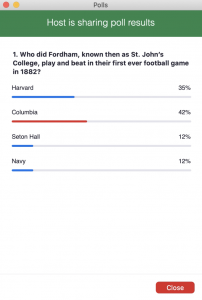
“This evening is our gift to you. The 48 Founder’s scholars are so grateful that we are still learning, thriving, and dreaming at Fordham with your generous support,” said the evening’s emcee, Founder’s scholar Stevie Rosignol-Cortez, FCLC ’21, a political science student from Texas and an aspiring foreign correspondent.
At the end of the night, Father McShane and Bob Daleo, GABELLI ’72, chair of Fordham’s Board of Trustees and co-chair of the Founder’s Dinner, offered several toasts to the three Founder’s 2021 honorees; the previous Founder’s award recipients, many of whom joined the virtual reception; and Bill Baker, president emeritus of Thirteen-WNET and Fordham’s journalist-in-residence, who retired this year from his 12-year-long role as the Founder’s Dinner emcee.
“My friends, let me end with a final toast to the evening,” said Father McShane. “To Fordham: may she always be what she was founded to be—a daring and dangerous school where character has been formed, talent has been nurtured, and hope has been borne for 180 years.”
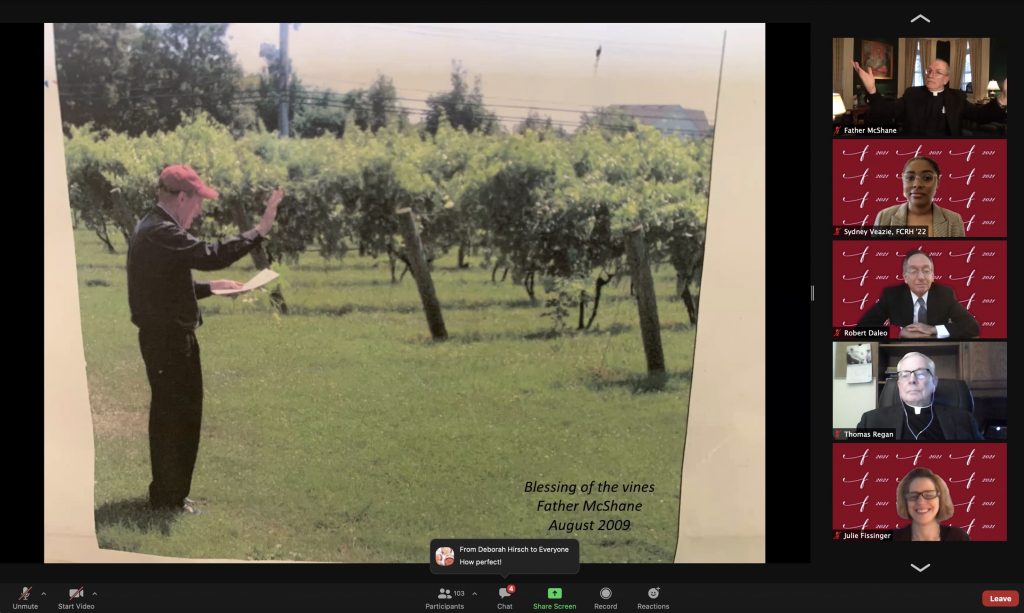
The papal honor—investiture as a knight in the Order of St. Gregory the Great—was bestowed on him by Archbishop Claudio Gugerotti, the apostolic nuncio to Great Britain, for his longtime support for the church, including helping make possible the canonization of Saint John Henry Newman in 2019, as well as his support for Fordham.
Loschert’s gifts to Fordham established an endowed chair in entrepreneurship and have funded scholarships, construction at the Rose Hill campus, and a lecture series at Fordham’s London campus. Loschert served for six years on the Fordham University Board of Trustees and has hosted more than 1,000 Fordham students at his home in London.
For his contributions to the University, Loschert received an honorary degree from Fordham in 2015 and the Founder’s Award in 2018. In 2009, Rose Hill’s Loschert Hall, formerly known as Alumni Court North, was named in his honor.
Loschert grew up in Queens and paid for his education by working part time at an insurance company. After graduating, he began a career in the insurance industry. In the mid-1980s, he helped launch ACE Limited, which has since become one of the largest property and casualty insurance companies in the world. He served in the company’s Bermuda office before going to London as chairman of ACE UK Limited in 1996. In London, Loschert became the first American to sit on the council of Lloyd’s. His appreciation for what his Jesuit education brought to his business career was clear from a quip he made prior to being honored at the 2018 Fordham Founder’s Dinner: “I studied accounting and philosophy. I never practice accounting; I practice philosophy all the time.”
At the dinner, Joseph M. McShane, S.J., president of Fordham University, called Loschert “an extraordinary presence for Fordham in London,” and at the dedication ceremony for Loschert Hall in 2009, Father McShane referred to him as “a man who has a love of learning and devotion to the cause of education.”
During that same 2009 ceremony, Loschert told attendees, “We all have the means to give—and not just money, but time and effort. It is our duty to help others and future generations.”
]]>After the TV star died on November 8, 2020, his son, Matthew Trebek, FCRH ’13, got the idea of donating much of his large assortment of clothes: 14 suits, 58 dress shirts, and 300 neckties, as well as shoes, belts, dress slacks, and other items.
The recipient? The Doe Fund, a nonprofit in New York City that Matthew Trebek has supported, which helps men coming back from homelessness, incarceration, and addiction who are seeking to rebuild their lives and find work.
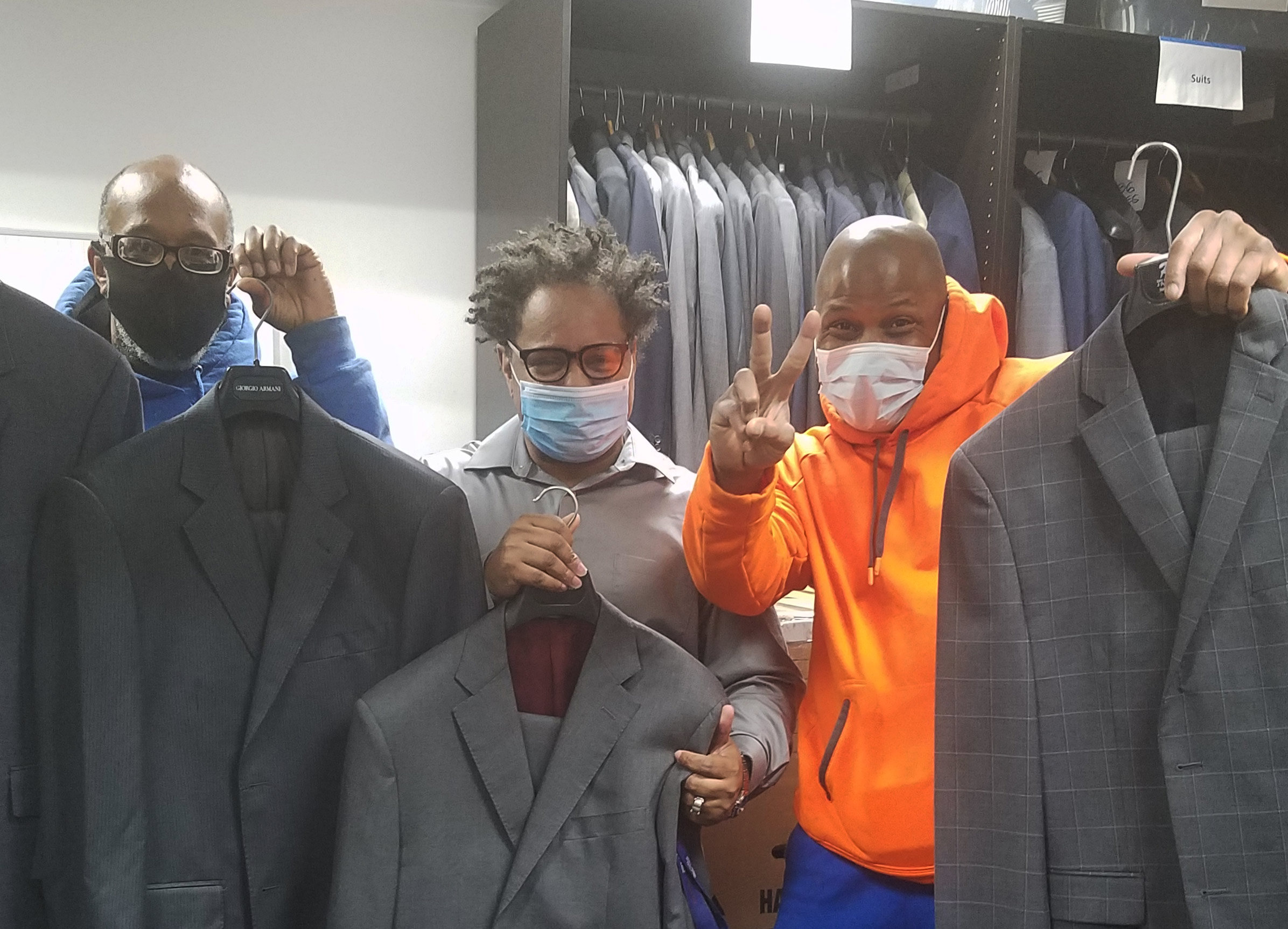
“The Doe Fund made perfect sense, since these are guys who are going on job interviews and need second chances,” Matthew Trebek, a New York restaurateur, told The New York Times.
The management of Jeopardy! embraced the idea and helped deliver the clothes, the show announced on February 9. The items were sure to make an impact on the lives of those served by the Doe Fund, its president, Harriet McDonald, told CBS Weekend News.
“People lose a lot of dignity if they’re homeless or incarcerated, and then all of a sudden, they’re in a work environment,” she said. “If you wear a good suit—and, of course, whose suits could be better?—you fit in.”
A Host Who Gave the Utmost
Alex Trebek was beloved as the poised, cordial host of Jeopardy!, which he hosted for nearly four decades before succumbing to pancreatic cancer last November at the age of 80. Along with his wife, Jean Trebek, he was a prolific philanthropist who supported a variety of causes including World Vision, an international anti-poverty organization, and funded educational and cultural initiatives such as a public policy forum and innovation and challenge fund at the University of Ottawa, Trebek’s alma mater.
The Trebeks also created a scholarship fund at Fordham for students from north and east Harlem, reflecting their belief in the power of education, and they have given of their time to the University as well.
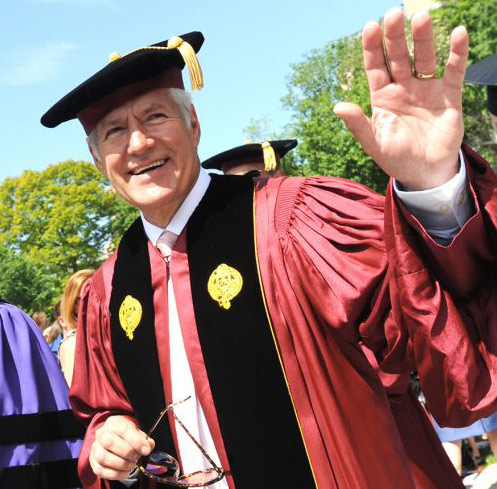
The University awarded Alex Trebek an honorary doctorate at its 2011 commencement ceremony and presented them with the Fordham Founder’s Award in January 2020 in Los Angeles.
Trebek emphasized kindness and empathy, telling the audience during one of his final Jeopardy! appearances, “We’re trying to build a gentler, kinder society, and if we all pitch in just a little bit, we’re going to get there.”
Matthew Trebek is co-owner of three Harlem restaurants—Oso, Lucille’s, and Pizza by Lucille’s—who also has a drive for service. He and his business partners created a weekly soup kitchen, Lucille’s Family Meal, for people in North Harlem living in poverty or transitional housing, as he told his mother in an interview on her web platform, insidewink. Held at St. Matthew’s Baptist Church, the soup kitchen aims for “a more dignified dining experience” for its guests, he said.
He told CBS Weekend News that his father would be pleased to see how his former wardrobe was being put to use.
“I think [it] just really falls in line with everything that he believed, and I think that would mean a lot to him.”
]]>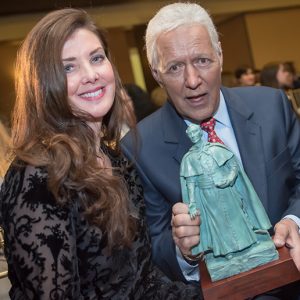
“Much as we loved Alex as the award-winning television host of Jeopardy!, I believe he came to mean more to Fordham—and to the public—as an educator and a spokesperson for the power of education,” said Joseph M. McShane, S.J., president of Fordham. “He gave knowledge and expertise a cachet among a broad audience in a time when those qualities seemed under assault in popular entertainment. Today we, and the world, grieve with his wife, Jean, and his children, Emily, Matthew, and Nicky, over the loss of this exceptional and compassionate man.”
From the moment Trebek arrived at the Rose Hill campus in 2009 with his son Matt Trebek, FCRH ’13, a prospective student at the time, to more than seven years after Matt graduated, Trebek and his wife Jean have been model University parents. Both gave generously, not just to the Alex Trebek Endowed Scholarship Fund they created, but of their time as well.
In 2011, the same year the University bestowed an honorary degree upon him, Trebek set time aside time from his busy schedule to host a Q&A with students from Rose Hill. He was celebrating 50 years in the industry at the time.
“There is a line that I heard not too long ago that goes, ‘Find something you’re good at, and if you really like doing it, you will never have to work a day in your life,” Trebek told the students. “That’s the way it’s been for me and broadcasting.”
His generosity of time continued through his illness, as was noted by Jeopardy! contestant Ed Condon, FCRH ’84. Cordon was a two-day champion on episodes that aired in October 2019.
“Alex Trebek is incredible because he’s doing all this stuff he doesn’t have to do,” Condon said at the time, noting that despite his illness Trebek spent hours with contestants and the studio audience, talking to them and answering their questions.
Receiving the Fordham Founder’s Award
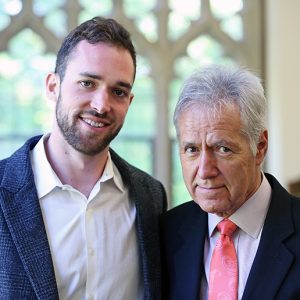
His steadfast dependability was on display on Jan. 7 when the Trebeks were honored with the Fordham Founder’s Award at a special award ceremony held in Los Angeles. Trebek arrived straight from the studio, still in makeup after recording five episodes of Jeopardy!. It was the first time the statuette of Fordham founder Archbishop John Hughes was presented outside of New York City.
The award citation noted that in his more than three decades of hosting Jeopardy! Trebek received numerous accolades, including six Daytime Emmys (now seven) and a Lifetime Achievement Award from the Television Academy. In 2011, the show received a Peabody Award for “encouraging, celebrating, and rewarding knowledge” while maintaining “a model of integrity and decorum.”
On bestowing the Founder’s award, Father McShane underscored what Trebek has meant to millions of viewers.
“He’s a brilliant man who is the nation’s schoolteacher, let’s admit that. As the host of Jeopardy!, he is our schoolteacher and we look forward to going to school every evening,” he said.
Trebek was visibly moved during his acceptance speech at the event. He spoke of how his Catholic upbringing helped him amidst the cancer treatments.
“If there’s one thing I have discovered in the past year it is that power of prayer,” he said, holding back tears. “I learned it from the Jesuits when I was a kid, l learned it from the Oblates of Mary Immaculate when I was in boarding school,” he said.
A Canadian-American Success Story
A native of Sudbury, Ontario, Trebek attended Jesuit grade schools that laid a foundation for the two degrees in philosophy he eventually earned at the University of Ottawa. In a 2008 interview with CBC, Trebek was asked why he studied philosophy. He provided a rather Jesuitical response.
“I got into philosophy to figure out what on earth I was doing on earth,” he said.
He said in the interview that he had “drifted into broadcasting” and found it to be a good fit. Yet, even as his chosen profession took him toward gameshows, he said he favored competitions that required contestants “to win the old-fashioned way, earning it.”
“They have to be bright; they have to know something,” he said.
Trebek was first noticed by American viewers in 1973 when he hosted the NBC game show Wizard of Odds. After several other hosting roles, he was chosen to host Jeopardy! He was a hit with viewers and soon became a pop culture icon, setting the world record for hosting the most episodes of a game show.
Lance Strate, Ph.D., professor of communication and media studies, said that for many Americans, having Trebek in their homes night after night gave them a sense that they knew him.
“We knew him parasocially, which is to say we knew him, but he didn’t know us,” said Strate. “Alex Trebek is the teacher we all wanted to have growing up.”
Strate said that the game show host also evoked an earlier time when radio was the primary medium and quiz shows celebrated the spoken word.
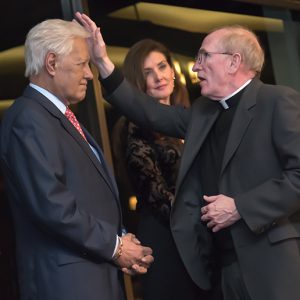
“Jeopardy! has been a throwback in contrast to recent game show formats that have morphed into reality TV and are more visual and action-oriented,” he said. “With the focus on text and words, that put much more emphasis on the host. He became a much more powerful presence because of that, and that’s also why his loss is felt so profoundly.”
He added that Trebek also represented the idea that one could get ahead by the strength of one’s mind rather than by luck.
“In a sense, he symbolized the idea of college itself—that education is important, and it is something that continues,” he said.
Family Life
Throughout his career, Trebek led a rich family life. Over the years, he remained a devoted father to Nicky Trebek, whom he adopted during his first marriage to her mother, Elaine Callei Trebek. The couple separated in the early ’80s.
He met Long Island native Jean Currivan—a businesswoman, author, and spiritual counselor—at a party in New York in 1988. They married two years later and had two children together: Emily and Matthew. The siblings both chose Jesuit schools for college. Emily graduated from Loyola Marymount University in Los Angeles in 2015 and went on to a career in real estate. Matthew graduated from Fordham College at Rose Hill in 2013 and, like his father, earned a degree in philosophy.
Matthew now lives in Harlem and owns and runs three restaurants there: Oso, a Mexican restaurant at 140th and Amsterdam Avenue; Pizza by Lucille’s; and Lucille’s Coffee & Cocktails. The last two are named for his grandmother and located at 150th Street and Frederick Douglass Boulevard. His chosen university and neighborhood have become part of his parents’ lives as well.
“I have seen the benefits of a Fordham education close up,” Trebek told Fordham News in 2015. “My son’s career at the University not only sharpened his intellect but helped him develop as a leader and a well-rounded person.”
In a 2016 interview with Fordham Magazine, Matthew said that while his father doesn’t necessarily share in devotion to food—“He would be fine eating chicken, white rice, and broccoli for the rest of his life”— he shared an appreciation of his son’s adoptive home.
Giving Back
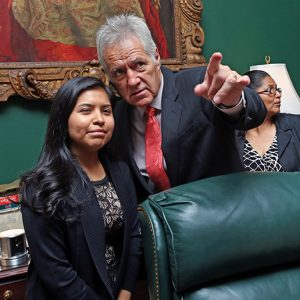
In 2015, the Trebeks established the Alex Trebek Endowed Scholarship Fund with a gift of $1 million. Four years later they made an additional gift of $1 million to the fund, which supports students from North Harlem and East Harlem.
“We have a soft spot for Harlem,” Jean Trebek told Fordham News last year.
At the ceremony, Jean said that she and her husband find the very idea of how a scholarship can change a life “awe-inspiring.”
One of the Trebek scholarship recipients, Joel Gomez FCRH ’19, said that even though he knew Trebek was ill, the news of his passing still came as a surprise.
“Just seeing the news, it comes as a shock. He’s Alex Trebek, he’s been hosting Jeopardy! for as long as I’ve been around,” said Gomez. “The first thing I thought about was the scholarship that I was gifted through him. I tweeted out thank you.”
Gomez attended a high school in the South Bronx where the student body was “about 98 percent men of color.” He stressed that the gift’s geographic emphasis was good for him and the University as a whole.
“It’s important to see that the University caters to different students,” he said. “Giving help to students like me lets me absorb different cultures and that experience is really important.”
Gomez took note of Trebek’s Canadian background and appreciated how the gift crossed boundaries and cultures.
“I think it’s exciting, he grew up in a completely different culture and to give back later to a whole different community—it’s pretty dope,” he said.
In their philanthropy, the Trebeks have supported World Vision, an international anti-poverty organization, as well as many other humanitarian and educational organizations. They also established a forum on public policy issues and an innovation/challenge fund at the University of Ottawa.
“You think Alex Trebek is a good man; you don’t know the half of it,” Father McShane said at the Founder’s ceremony in L.A. “He teaches us about how to live each day with purpose, with focus, with determination, with love, and without being obsessed with oneself. All that he does is outwardly directed.”
‘Everything Is Possible’
At the L.A. event, Father McShane said that by publicly sharing his journey with cancer, Trebek had actually evolved his role to that of minister. He then asked the crowd to say the Lord’s Prayer for Trebek and his “ministry.”
The gesture threw Trebek slightly off-balance before he regained composure by holding his wife’s hand and entering a state of prayer.
In his acceptance speech, he reflected on what gives meaning to one’s life.
“If you have compassion in your heart, everything is possible, peace everywhere is possible,” Trebek said. “If we are able to affect society in a positive way then our lives will not be for naught.”
Trebek is survived by his wife and children. His final episodes of Jeopardy! will air through Dec. 25.
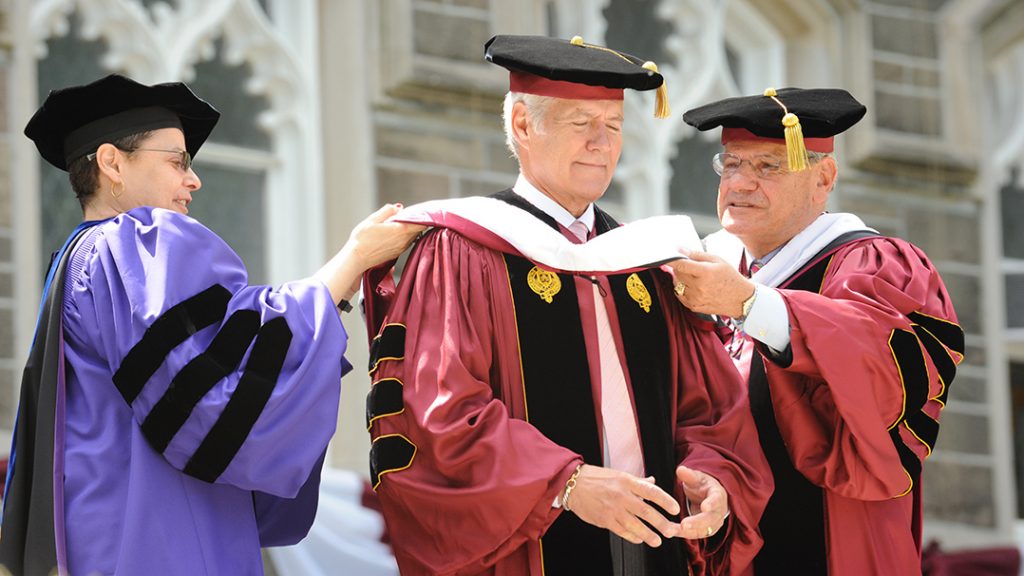
Joe Moglia, FCRH ’71, blazed a trail of ascent at Merrill Lynch and then at the helm of TD Ameritrade over 24 years until, in 2008, he decided to return to the most rewarding work he knew—coaching football.
A New York City native, Moglia served as a baseball and football team captain while attending Fordham Preparatory School and then coached football at the Prep while working his way through Fordham College at Rose Hill. After graduation, he coached and taught at a Catholic boys’ school near the University of Delaware, where he earned a master’s in education, and later helped Dartmouth College win two Ivy League championships as defensive coordinator.
In 1984, after 16 years of coaching, family responsibilities and his interest in business led him to join the MBA training program at Merrill Lynch—as the one football coach among 25 MBA holders. “Everybody said, ‘This football guy is never going to make it here,’” he recalled. But he excelled, becoming the firm’s top worldwide producer and rising to high-level posts before joining TD Ameritrade as CEO from 2001 to 2008.
When he stepped down in 2008, shareholders had enjoyed a 500% return. In 2009 he became chairman of the board. Recently, TD Ameritrade announced that they would be acquired by Charles Schwab. The combined company will be worth $100 billion and have client assets of $5 trillion; When Moglia first arrived, these numbers were $700 million and $24 billion.
Prior to 2019, he was the head football coach at Coastal Carolina University, and in his first five seasons he led his team to the national playoffs all five years and to four conference championships, posting an overall record of 56-22 and a winning percentage of .718. In his last 11 years of college coaching, he has been a part of eight championship teams. He has also received multiple Coach of the Year honors, including the Eddie Robinson National Coach of the Year award, and was the recipient of the Vince Lombardi Award, and inducted into the Lombardi Hall of Fame.
His career is the subject of the 2012 book 4th & Goal: One Man’s Quest to Recapture His Dream, by Monte Burke. And Moglia has authored books on both coaching and investing—The Perimeter Attack Offense: The Key to Winning Football in 1982 and Coach Yourself to Success: Winning the Investment Game in 2005. This year he plans to start writing a third book, on leadership.
In advance of the Founder’s Dinner, Moglia sat down with FORDHAM magazine to talk about lessons learned in boardrooms and on the gridiron, as well as his struggles with a speech disorder that always draws surprised reactions whenever he tells people about it.
What was it like going from coaching football to the world of business when you joined Merrill Lynch?
While I didn’t have an MBA at all, I did have the background and skill set and characteristics that would make for an effective transition. I really believed that my 16 years of experience as a coach made me a better businessman. As a coach, it’s absolutely critical to be able to handle yourself under stress. You’ve got to be able to understand people, think strategically, and make decisions quickly. While it’s helpful for a coach to be reasonably charismatic, he or she has got to be a great communicator, a good teacher. And as a coach you’re very often representing a community at large, whether it’s a university, a community, a state, or a town.
What’s some other common ground between coaching and business?
You have to be sophisticated and smart enough to have a well-developed strategy that has contingency plans. It’s much easier to adapt and adjust it if you’ve got a well-thought-out concept behind it, and if it’s simple enough to execute. I’d say based on game plans and business plans that I’ve seen from my competitors, if they have a fault, it’s that they’re not simple enough. It may sound smart, it may sound great in a speech and in the board room, but if the 50 people who work for you don’t know it that well, they won’t be able to execute it.
In either field, knowing the strengths and the weaknesses of any part of your organization is critical. So if you want to expand in China and you have no competitive advantage in China, you should think that through. But many businesses will say, “You’ve got to expand in China! How can we not?” But if you don’t understand your core competencies, if you don’t know how to lever those competitive advantages, that’s probably not a smart idea.
You also have to adjust based on your people’s strengths and weaknesses. In football, when the first-string quarterback goes down, for instance, the second-string quarterback is often expected to know the same system. But he doesn’t have the same skill set, so you don’t ask him to do the same thing as the other guy. The second- or third-string quarterbacks will practice certain plays that the team has in common, but they should also practice the plays they know they’re pretty good at. And in business, for instance, there are certain skills a chief financial officer is supposed to have, but one might really have an understanding of marketing, and another might be stronger at strategy. So I will shape the job differently for one CFO than I would for another.
How did you come to return to coaching?
I stepped down as CEO of TD Ameritrade because the timing was right. But then I got a call from a group of alumni at Yale telling me there was a chance the football job would be open at the end of the 2008 season, and would I be interested? No transition like this had ever happened in college football. But I thought about it; I’ve always looked at the game like chess, with 22 pieces moving at once with a lot at stake, under serious time constraints with everybody watching, and I’ve always found that intellectually stimulating. And as a coach, I got so much satisfaction from working with the players. Having an impact on them was very, very important. That was my mantra my entire business career. My people mattered and I knew I had an impact on them. That’s what drives me.
So going back and representing the university, the community, the alumni, the faculty, and the students, but also having an impact on a 20-year-old, helping him really truly grow up—I didn’t think anything else could give me greater satisfaction in life.
Among your awards and honors are some related to stuttering, including the Hero Award from the Stuttering Association for the Young. Can you talk about your own struggles?
I have a pretty serious stutter. In grammar school through college, if I knew the answer to a question in class, I wouldn’t raise my hand, because I was afraid I couldn’t get my words out. And then I decided that I wanted to take this assistant coaching job at Fordham Prep. Well, of course a coach has to communicate. So I would practice in front of a mirror again and again. I had to speak at the Fordham Prep football banquet for three minutes; I can’t tell you how nervous I was, but I prepared 10 hours for that three minutes and I got through it. There is seldom a time in my life where I don’t have a fear that I’m not going to be able to talk.
I’ve spoken in a lot of different places and I am so incredibly well prepared. I know I’ve got something to say and I’ve probably said it 150 times already. So I have a confidence level with that. But sometimes when I’m tired or stressed, I really struggle to get my words out. Sometimes I would bridge to another word quickly—I can’t get out “banana,” but I’d say “fruit.” I’d trick myself, just to get “fruit” out there. I’ve done a good job of controlling it over the years, but stuttering is still a very, very real thing for me.
How would your life be different if you hadn’t gone to Fordham?
A big part of whatever success I’ve achieved across two career paths is because of Fordham. I’ve always said that. I’ll say it again.
It has stuck with him ever since. “He basically said the world is out there, you have to find your purpose.”
It’s safe to say he found it. Today he is chairman and CEO of PVH Corp., the world’s second-largest apparel company and parent company of Calvin Klein and Tommy Hilfiger. Manny, GABELLI ’79, has won numerous accolades for proving that profitability and corporate social responsibility are compatible. For example, PVH recently placed at No. 16 out of 300 firms in the recent Newsweek ranking, “America’s Most Responsible Companies 2020.”
This month, the company announced a partnership with the Gabelli School of Business to help develop its sustainability curriculum, and is contributing $1 million to the effort. On January 28, at its Calvin Klein offices, PVH will host the kickoff event for the Gabelli School’s yearlong centennial celebration.
Manny and his wife, Joanne, support a variety of health- and education-related organizations, including investing in Fordham, particularly in the area of career services and experiential education. Their consonance with the mission of Fordham will be highlighted on March 30 at the Fordham Founder’s Dinner, where they will be among the recipients of the Founder’s Award. (Editor’s note: The 2020 Founder’s Dinner has been canceled; the Chiricos will be honored at the Founder’s Dinner on Monday, March 22, 2021.)
The Chiricos have long been involved with the University; two of their three grown sons are Fordham alumni, and Manny has served on the Board of Trustees. They recently spoke with FORDHAM magazine about some of the balancing acts in their lives—between profit and purpose, and between helping your college-age children versus letting them learn hard lessons on their own.
How has your Fordham education influenced your leadership of PVH?
Manny: I’ve always admired the Jesuits for putting forward the Catholic social justice traditions and engaging with societal issues, and I’ve tried to bring that perspective into my decision-making. I’ve been with PVH for more than 25 years, and we’ve always had a purpose as a company that went beyond just driving profitability each quarter. I think it’s important that you have that corporate purpose and that you balance all your stakeholders when you’re making business decisions. Our corporate purpose, “we power brands that drive fashion forward for good,” sums up how we manage our business.
How does that work in practice?
Manny: Our company has a number of stakeholders—our shareholders, associates, suppliers, customers, and the communities where we operate. All of these groups are impacted by our business decisions, and the most difficult decisions are the ones that negatively impact people’s lives. For example, if a decision is made to close one of our factories and outsource the production in order to save $10 million per year, two stakeholder groups are going to be directly impacted: our shareholders positively and our factory employees negatively. Our shareholders will enjoy the financial benefits of the cost savings while our factory employees will lose their jobs. I think the only way to make these types of decisions is to always consider what is best for both the long-term health of the company and its stakeholders. The company must be financially strong and competitively positioned for the future so it can continue to invest in its business and its talent. For the negatively impacted employees, the company has as obligation to provide a reasonable transition through a generous severance and benefit package as well as future job training. It’s the right thing to do—for the employees but also for the company. Your company’s reputation in the market sits with customers, shareholders, and your future, current, and former associates.
Financial results are critical, but there needs to be a shift in focus from short-term quarterly results to long-term financial performance. By focusing on creating shareholder value over the long term, you bring all stakeholders’ interests into greater alignment.
As parents of three successful college graduates, what would you say to today’s students and parents? Fordham experts have warned of the increasing anxiety and perfectionism hampering today’s students. Any advice?
Manny: I would say there’s too much pressure put on grades and too much “your resume has to be perfect.” Those things are not unimportant, but as a parent, you want to try to bring some perspective to all of that. You don’t need to have five jobs, or be in 15 clubs. Bring some balance to it. And let them make mistakes, within boundaries. You have to experience failure. Everything is not going to be smooth all the time, and as a parent, I think you’ve got to get that point across. That’s the nature of life and business. I always say, “fail fast and move on.” At PVH, when we’re looking for talented people, we’re looking for people who can adapt, get things done, and deal with adversity and constant disruption. The only way you build resiliency is by struggling.
Joanne: As parents, you can’t fix everything. If one of our kids came home saying something negative about a professor, Manny would say, “Well, one of your bosses is going to be the same way.” I think college is a maturing process. You’re going to take classes you love, you’re going to take classes you hate, and maybe you’re going to find out in your third year that you’re in the wrong major and have to switch and make up a couple of classes. Sometimes your major isn’t even what you end up doing. And you need those different experiences.
Our kids always worked—not during the school year, but they had to work during summer. They weren’t going to sleep until noon, they had to get up with alarm clocks. They commuted to the city, they worked in mail rooms, they worked in different areas so they get a feel of what they wanted. Our youngest son worked at our church—answering the phones, painting the school bathrooms, and one day he came home covered with dirt because he had to help dig a grave. I thought it was a great experience for him because he knew he didn’t want to be doing manual labor in 90-degree heat in the middle of the summer. Not that there’s anything wrong with that, but he knew that wasn’t for him.
Manny: We pushed very hard for our boys to be involved at Fordham, because clubs and activities balance out what you’re learning in the classroom. And they all played sports, which really teaches you how to work as a group, one of the most important things you have to do in a business. We always found their grades were better during seasons when they had less free time, because they had to manage the demands better.
How should students approach internships? Is it all about skills and hands-on experience?
Manny: It depends what you want. If you want to be in public accounting and you get the opportunity at an internship with one of the big accounting firms, you should take that experience because it’s going to lead to where you want to go. With the internships, it’s about the job you’re doing, but it’s also the experience you’re getting. And as much as possible, try to reach out and get exposed in that environment to as many people as you can. Talking to them about their experiences is as valuable as the actual job experience. It opens up a sphere and you get to see things through other people’s eyes. I think that’s one of the real benefits of internships.
Why did you feel it was important to invest in career services and experiential education at Fordham?
Joanne: Our kids’ advantage was that they had Manny at home. So, they had someone that was pushing them in the right direction, pushing them with mock interviews and things like that. Not everybody has that. Some kids are coming out of families that are not in the professional world. They don’t have that guidance, and that’s why it’s so important for the schools to help.
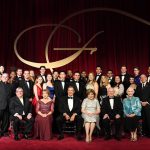


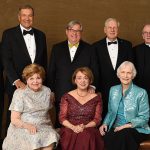

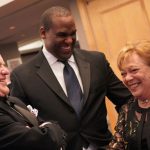
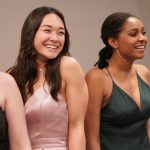
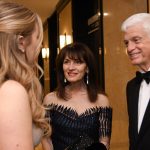
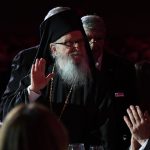

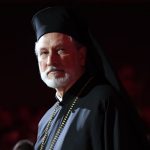
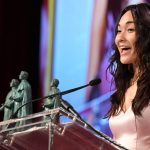
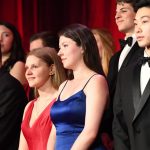

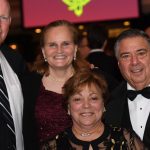

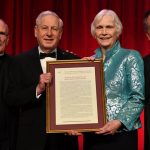
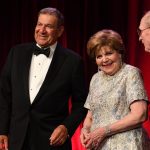
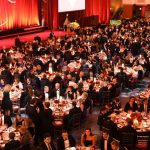
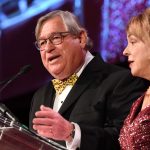
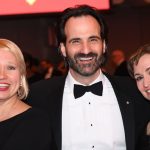
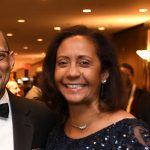
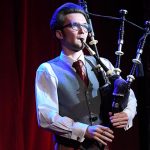
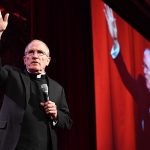
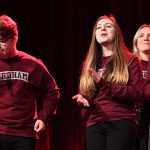
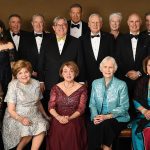 The University’s Founder’s scholars and biggest benefactors came together on March 25 for Fordham’s signature annual fundraising event: the 18th annual Fordham Founder’s Dinner. The gala raised nearly $2.6 million for the Founder’s Undergraduate Scholarship Fund—the second highest amount in Founder’s history.
The University’s Founder’s scholars and biggest benefactors came together on March 25 for Fordham’s signature annual fundraising event: the 18th annual Fordham Founder’s Dinner. The gala raised nearly $2.6 million for the Founder’s Undergraduate Scholarship Fund—the second highest amount in Founder’s history.
More than 1,000 alumni and friends of Fordham attended the black-tie affair at the New York Hilton Midtown—a new venue for the dinner and a hotel that has hosted every U.S. president since John F. Kennedy.
The 2019 celebration lauded six longtime supporters of Fordham—Solon P. Patterson and Marianna R. Patterson; Joel I. Picket and Joan Picket; and Dennis G. Ruppel, FCRH ’68 and Patricia Ann Ruppel—and honored 44 Founder’s Scholars, whose Fordham education was largely made possible by the Founder’s Scholarship.
This year’s gala also celebrated and supported Faith & Hope | The Campaign for Financial Aid. Over the past two years, the campaign has reached more than 90 percent of its $175 million goal.
But at its heart, the dinner was more than a meal among those who love the University. It was a toast to the people—every person connected to Fordham’s 178 years of life.
In addressing the crowd, Joseph M. McShane, S.J., president of Fordham, recounted the day he met a few friendly locals in a Florida fishing shop. They complimented the Fordham baseball cap atop his head—but they mistook his gear for a Florida State hat. They had no idea what Fordham was. But the innate issue was their question: “What is Fordham?”
“Fordham is not a ‘what,’” Father McShane said. “Fordham is a ‘who.’”
“Now, I know that sounds like a bad new Dr. Seuss book,” Father McShane said, to the audience’s laughter. “But I truly believe it’s the truth.”
“Fordham is a world-class faculty, a hardworking staff, talented and devoted administrators, students, trustees, donors, alumni—all of whom are men and women for others.”
A Bittersweet Thank-You
Beneath the dimmed lights of the Grand Ballroom, Amie Ko, GABELLI ’19, spoke on behalf of the Founder’s Scholars.
“On this night, standing before you, I can’t help but think that in 54 days I will no longer be an undergraduate student at Fordham,” said Ko, an aspiring tax accountant who will intern at PricewaterhouseCoopers this summer. “From the start of the semester, I have been asked countless times: ‘How does that make you feel?’ And to be very honest, I am scared. I am nervous. I am sad,” she said.
“But most of all, I am incredibly thankful.”
Ko, a Division I athlete for Fordham’s swimming and diving team who recently led her team to its first undefeated season in almost a decade, spoke about her gratitude for her teammates, her four years of Fordham memories, and the donors who made her current reality possible.
She also took a moment to remember one Founder’s scholar who couldn’t make it: Rachel Ragone, GABELLI ’18, who died last January after a long battle with bone cancer. As Ko recounted Ragone’s four years at Fordham—her studies in applied accounting and finance, her semester spent at Fordham’s London Centre, her passion for raising funds and awareness for children’s cancer—a photo collage of Ragone appeared in the background.
“As Rachel’s mom Kim Ragone has shared with us,” said Ko, “‘Fordham gave Rachel the best time of her life.’”
Honoring Three Couples
During the festivities, Father McShane presented the Fordham Founder’s Award to each of the three couples honored this year.
The Pattersons, natives of Atlanta, have been married for nearly 60 years. Solon Patterson worked for 48 years in investment management; he retired in 2007 as CEO of the investment firm Montag and Caldwell. Marianna Patterson worked in the banking industry before becoming a full-time mother.
The couple has been instrumental in helping Fordham’s Orthodox Christian Studies Center to prosper over the past decade. In the early 2000s, they created an endowment to establish the Patterson Triennial Conference on Orthodox/Catholic Relations.
“In the process, they have enabled Fordham to become the only Catholic university in the world that offers degree programs in Eastern Orthodox studies,” said Father McShane.
They also established the Father John Meyendorff & Patterson Family Chair of Orthodox Christian Studies, now held by Professor George Demacopoulos.
“Solon is Greek Orthodox, and I am Roman Catholic, and we have long prayed for the end of the separation of these oldest and largest Christian bodies. Their reunion would be a positive event for all Christians the world over,” Marianna Patterson said.
The Pickets are longtime New York philanthropists. Joel Picket, a Manhattan native, is the chairman and CEO of Gotham Organization—the real estate development firm that was key to constructing several buildings on campus, including the Law School/McKeon Hall complex at Lincoln Center and the William D. Walsh Family Library at Rose Hill. He is a two-term member of the Board of Trustees and a current trustee fellow who helped make the master plan for the Lincoln Center campus redevelopment a reality. Joan Picket, who has worked as an advertising copywriter and real estate broker, has served in multiple service organizations.
Together, the couple’s generosity spans several initiatives at Fordham, from scholarship support for Jewish studies to the funding of new campus facilities.
“Neither of us have a Fordham education,” Joel Picket said. “[But] from my first introduction to Father O’Hare to what we consider a special relationship with Father McShane, I have seen what strong and dedicated leadership means and grasped the greatness of the Jesuit education.”
The last couple includes a Fordham alumnus—Dennis Ruppel. Today, Ruppel is chairman of Freedom Bank, chairman of AmCap Insurance, and co-owner of the Press Hotel in Portland, Maine. He is a current trustee fellow who has served multiple terms on Fordham’s board of trustees. Dennis and his wife, Patricia Ann, champion multiple organizations, particularly those devoted to early childhood education.
“In her own words, Pat has ‘adopted Fordham,’ and carries the University in her heart,” said Robert D. Daleo, GABELLI ’72, chair of Fordham’s board of trustees and a Founder’s 2019 co-chair.
At Fordham, the couple created the Dennis and Patricia Ruppel Endowed Scholarship. They have also supported athletics, WFUV, career services and experiential education, the sailing program, and other University endeavors.
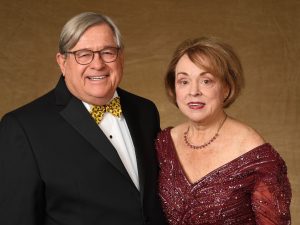
“Fordham had few students from Florida when I arrived in 1964, never having been in New York City. I was the virtual stranger in a strange land,” Dennis Ruppel said.
“Within weeks, I realized how special Fordham is: classmates who were bright, questioning, and welcoming; professors whose love and mastery of their subject was infectious; an atmosphere filled with the Ignatian care for the whole person; and, in the Jesuit tradition, the expectation that we live our lives in the service of others.”
The 2019 awardees join 47 other Founder’s Award recipients, the first of whom were honored in 2002.
Examples of a Life Well Lived
“I praise God for what you have become and who you have become and how you have become, first of all, examples of a life well-lived with a strong moral compass,” Father McShane said, gazing at the hundreds of faces across the ballroom. “Tonight, it is my great honor to look at all of you and say to you, ‘You, my friends, are our treasure.’”
To make a gift to the Fordham Founder’s Undergraduate Scholarship Fund, please visit fordham.edu/foundersgiving.
]]>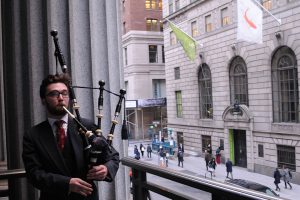
The 17th annual Fordham Founder’s Dinner, held March 19, raised a total of $2.2 million for the Fordham Founder’s Undergraduate Scholarship Fund and Faith & Hope | The Campaign for Financial Aid. So far, $131 million has been raised toward the campaign’s $175 million goal.
Speaking on behalf of her fellow Founder’s Scholars, Fordham College at Rose Hill senior Genie Hughes, a biology and theology major, thanked the donors for helping the scholars overcome financial barriers to education, and for being “bothered into action.”
She spoke of concepts—as opposed to facts—that she learned during her tenure at the University. She said new ideas and a “diversity of thought” have helped her and her classmates to make sense of things.
“It’s easy enough for a bio student to view life as a series of signal transduction pathways and neuronal networks that allow us to function,” she said. “But life—the thing we spend every day living—is made up of so much more than that.”
Founder’s Scholar Marla Louissaint, currently performing in the national tour of Beautiful: The Carole King Musical, took the stage and sang a moving rendition of “Will You Still Love Me Tomorrow” for the attendees.
A World of Infinite Possibilities

In thanking the donors for their generosity, Joseph M. McShane, S.J., president of Fordham, said their financial support—indeed all forms of scholarship support—“opens up a world of near-infinite possibilities.”
Those possibilities are reflected in the lives of the donors themselves, “with their talents, their vision, their discerning wisdom, and their passionate integrity.” In particular, he called out the evening’s three Founder’s Awards honorees: John R. Costantino, Esq., GABELLI ’67, LAW ’70, PAR; Barbara Costantino, PAR; and William J. Loschert, GABELLI ’61.
“They have lived their lives in ways that bring lustre to the University,” said Father McShane. “It also means that, having reflected deeply on the transforming impact that a Fordham education had on them, they have come to the realization that like all of us, they were the beneficiaries of a legacy they didn’t create.”
Legacy Builders
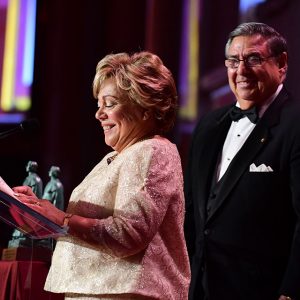
Bob Daleo, GABELLI ’72, chairman of the Board of Trustees and the event’s co-chair, said the Costantinos had a “shared love” of the University, and were generous in their support for the new Law School building, Fordham athletics, WFUV, and two scholarships—the Costantino Family Endowed Scholarship Fund, and the Edelman Postgraduate Fellowship in Neuroscience.
In accepting the Founder’s award, Fordham Trustee Emeritus John Costantino paid homage to his parents; his father, an orphan who emigrated to America from Sicily when he was just 14 years old, had little chance for a formal education.
“The proudest day of my parents’ lives was the day they attended my graduation at Fordham Law School,” he said. Although his father passed away just two months after the graduation ceremony, Costantino’s mother always felt that his father had “gotten his wish” to see him become a lawyer.
Barbara Costantino said she was honored to share the stage with her husband of 48 years, whom she’d known when he was a student in 1963 at Fordham’s business school. Back then, she said, she’d read and typed his college and law school papers—free of charge.
“I have often felt that I probably should have gotten an honorary Fordham degree [for that],” she said jokingly, and to applause.
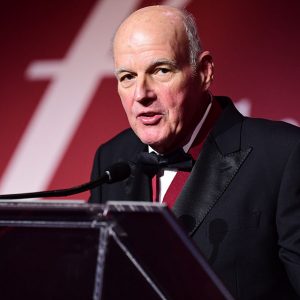
Trustee Fellow William J. Loschert, who has hosted more than 1,000 Fordham students at his home in London and is a steadfast supporter of Fordham faculty, scholarships, and building projects, captured the evening with the shortest acceptance speech—at approximately 30 seconds. He thanked Father McShane, Gabelli School of Business Dean Donna Rapaccioli, the Fordham faculty, and “most importantly the students.”
“Enjoy the rest of the evening, have another glass of wine, and God bless,” he said.
Although Loschert proved to be a man of few words, Father McShane called him “an extraordinary presence for Fordham in London … He has been a fatherly figure.”
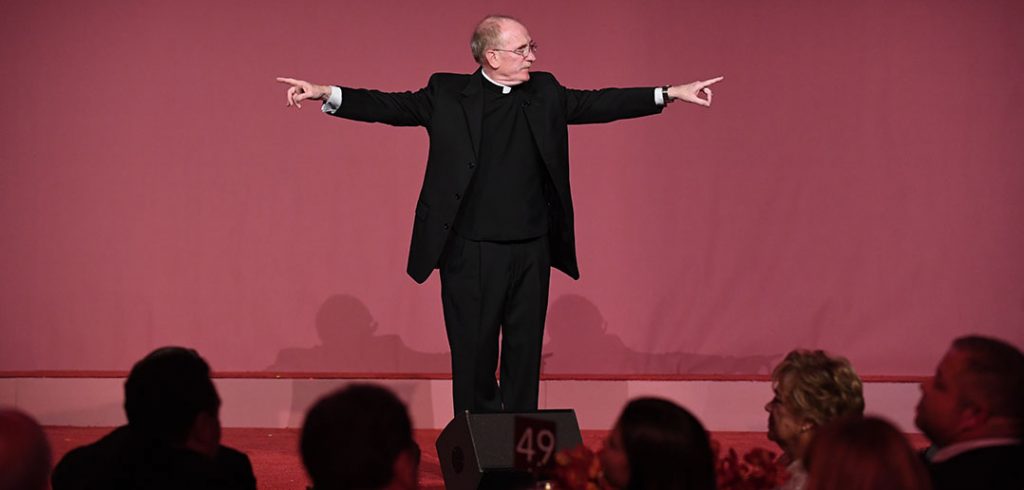
Into the Future
In his speech, Father McShane described Fordham’s founder, Archbishop “Dagger John” Hughes as “a fundraiser who was not afraid to knock on any door.”
“He was, thank God, incapable of dreaming small dreams,” Father McShane said. “Therefore, with zeal and urgency, he took on New York and American culture with what some thought was an unholy impatience.”
“Now I may be prejudiced, but the greatest of all his realized dreams was Fordham,” said Father McShane. “The dream was bold, its dividends have been rich—but the costs associated with ensuring the continuation of that legacy were, and are, high.”
He called the evening’s honorees “worthy successors” to the legacy of Dagger John. Just as Archbishop Hughes gave hope to the recent Irish immigrants, the Fordham Founder’s awardees have given the promise of an education to the scholars.
“You’re, for them, patron saints,” he said. “You are men and women, who, not knowing our students’ names, have harbored great hopes for them.”
View a slideshow
[doptg id=”107″]
Watch Founder’s Scholar Marla Louissaint Perform ‘Will You Still Love Me’
